#but alternatively: imagine you do this but the characters still meet a tragic fate
Explore tagged Tumblr posts
Text
You know how you can sequence skip in a Solstice run and leave the Barrens with the battery so you can use it for Cedric's flying machine?
It would've been so fucked up if you could prevent some deaths in Solstice by just having the right optional items or triggering optional conversations. (Though it may not be a good deign choice bc fans hate missing content). You probably can't save Silver or Maize due to their sacrifices being necessary to progress... but imagine giving Niko and the player a strange sense of relief if they told Calamus and Alula to leave the island while the boat is still there and before you trigger the conversation with Cedric. When squares take over the plane in the Refuge, Niko knows the bird siblings still have a chance to make it alive so they're hopeful that if those two can find an alternative, so can they.
You get the elevator in the clock room to work by using the crowbar and when it malfunctions you don't end up leaving the Lamplighter to die. Maybe you could even get him to use the other elevator to get the evacuees to safety. Or not, since it could malfunction. But it could still make his outcome diverge.
But what I mean is: wouldn't it be fucked up if there were some choices that did change the temporary outcomes for a few characters? To then walk online and hear how people reacted to scenes like Plight getting trapped in the elevator and you're wondering how that never happened in yours? How you felt so glad that you wanted to exhaust dialogue on time? That sense of acting on a hunch and changing fate temporarily because of it?
#oneshot (game)#oneshot game#solstice#This is just me rsmbling btw#if i had time i could write a little fic with each of these scenarios rkwkgkdk could u imsgine#call it. the solstice sidequests wktwktkwk#but alternatively: imagine you do this but the characters still meet a tragic fate#so.no matter what you do you realize you couldnt save them#but you lose them in different ways#I STILL vibe a little more with them like. Living#Then in the credits they comment to you how they felt really lucky and thank you for nudging them in the right direction#oh and also consider: You dont let plight die but never tell him about the elevator#he shows up in the credits anyways and is confused as FUCK as to why he is in a dark spacious room with some strangers#and the messiah he saw like. Once. Offered help to fix the elevatoe and never showed up again#IWKGKQKHKWF
7 notes
·
View notes
Text
Nah don't worry, it didn't come off as a disagreement, I always enjoy your inputs! I merely used it to explain why this analysis, while interesting, doesn't reflect my opinion but is still a valid interpretation.
Shiguang is really is a peculiar case, both because they indeed work well as friends/partners/queerplatonics/lovers and because the cultural context makes the storytelling different from what we're used to as an occidental audience.
Fans of american shows have been cursing over queerbaiting for decades while I personally was fed nicely with subtil japanese bromance since middle school. Imagine my surprise when I discovered chinese male friendships through 19DAYS and later Link Click. The no-gays-allowed policy really made me giggle because of course people would get ingenious in their writing to go around it.
The fact they thought that if Link Click was about two dudes it would be enough to make this story 100% aromantic is ludicrous, though. While the genre of Link Click is far from romance, it still started as a family show, character centric, and then turned into something of a thriller.
The story was always about two guys uncovering mysteries and helping people.
I personally would break space and time for friends and family, no questions asked, but isn't it natural to think only true love deserves the honor after all? I personally think the idea of time travel has been romanticized too many times to be free of the concept of the Ultimate Form of Love™. I mean, in the name of saving a dead wife AND a man's ego of course lmao.
So yeah, even chinese censorship or homophobic chads can't do much against, like, a century's worth of literature and cinema about going back in time for love. People can believe what they want, shiguang being gay or not is absolutely not the point: if the genders were different, they would also ship it, because that's just how the story goes and went in all previous media in the history of Time Travel. Regret might be the reason but you usually only want to go back so you can have happiness with someone again.
That's my take as far as canon goes: let it be, the story writes itself 😂

Now, about Lu Guang and his role in Cheng Xiaoshi's death, I have many, M A N Y theories actually.
The possession route is very plausible. Actually there are several threads about it on twitter supporting it. I cannot find the one where OP removes the red filter and Lu Guang still has red eyes but it's out there. Hard to say if dream sequence or memory, if original timeline or repeat.
A part of me is convinced that Lu Guang wasn't even part of Cheng Xiaoshi's life in the original timeline. Maybe there actually is a Time Agency and Lu Guang was part of it and he kinda grew fond of CXS while investigating his missing parents. Or maybe he was Vein's pupil until he realized how much of a psychopath he was and tried to bail, meeting CXS on a turn of fate.
Liu Xiao himself is a shady character who seems to have an interesting and tragic backstory. I wouldn't rule out the theory of him being an alternative version of Cheng Xiaoshi. Betrayed and left in a failed repeat.
There is still a tiny possibility that they pull a Kaishin on us and Lu Guang reveals himself as CXS's father. And if Lu Guang is actually Cheng Xiaoshi's friend since the beginning, could he be the one who gave CXS his powers one way or another? If so, wouldn't it save him to just... Keep them both from using their powers? Or did they gain their powers while on this post graduation trip after Cheng Xiaoshi's death? Are these powers only acquired after nearing death?
The darkest theory I have is that Cheng Xiaoshi has to die first for Lu Guang to reset the timeline... And there might have been times when Lu Guang killed him with his own hands in order to get a new chance at a better outcome.
Many secrets in Lu Guang's head and I'm pretty sure Yingdu Chapter won't give us the answers we seek. My take on all this is that if Lu Guang really wanted to save Cheng Xiaoshi's life, he wouldn't be in his life. But, you know: Man's ego, as I said. One of my theories is that he actually tried that one but failed (and the flash backs we saw of their meeting is actually Lu Guang failing at staying away).
But mostly: people tend to forget Qiao Ling's involvement too often. Her being in danger would be enough to make Cheng Xiaoshi risk it all, losing her would be enough to strip him from hope, sacrificing everything to save her is way too in character not to consider.
Why I think Shiguang can be canonically read as romantic
(I will only be using the donghua for reference, so no Studio Lan retweeting those fanarts (lmao) nor those especially gay manhwa panels (lmao x2) nor even the songs ("chase you to the end of the world, just to say your name once more" my beloved).
It's important to start off by saying that I'm aware Director Li said they ended up not making Lu Guang a girl because they didn't want romance to be seen as a must in Shiguang's relationship by the audience (and because he feels that "bros can have a good heart-to-heart connection with each other"). In my opinion that was a great move since it allows more freedom with how they write them than they'd have otherwise. I also think viewing Shiguang as queerplatonic is a great read too and it doesn't diminish their love for each other nor the importance of their relationship at all.
With that said, despite Director Li's words, there's been things that had me going 🤨 as someone who likes to adhere to canon relationships and read into the writer's intentions, so I wanted to share why I personally see them as romantic.
EPISODE 2
We've all seen this coming, right? Most obvious parallel ever, and in the second episode no less. We all know the similarities between both relationships, so I will just touch on those I consider the most important ones.
Lin Zhen and Yu Xia have gone to college together, and since then decided to start a business of their own - named after a mix of their names. They've been shown as being really close and having no romantic relationships. Lin Zhen also says that Yu Xia's happiness is her own, and then it's shown to us that she's gone through years of unhappiness just for Yu Xia. I believe you can replace their names with Lu Guang's and Cheng Xiaoshi's in your head without me writing all this again. And I'm not even going to get into the most obvious parallels like the special noodle recipe for each pair.
I think it's safe to say that Lin Zhen and Yu Xia are implied to be romantic. From that "one noodle" scene, to the close shot of Lin Zhen grabbing her hand, etc.
Now, I want to get into a writer's point of view and pose two questions:
1. What's the purpose of this episode, when even those which seem episodic connect to the overarching plot of season 1 (even the missing kid's case, as it leads to the involvement with the police)?
2. If we answer the previous question with the conclusion that it's meant to show us the nature/development of Cheng Xiaoshi's and Lu Guang's relationship, what does that say about it?
"Partner" in Link Click
Continuing with episode 2, what really got me thinking about the romantic intentions in their writing was the constant mention of marriage and anything in relation to it.
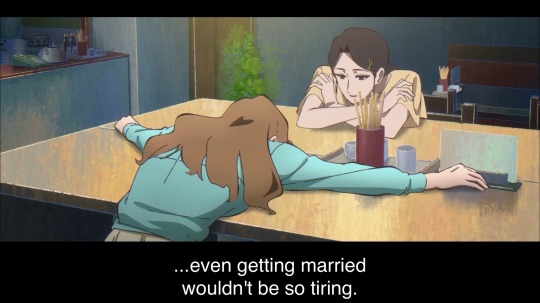
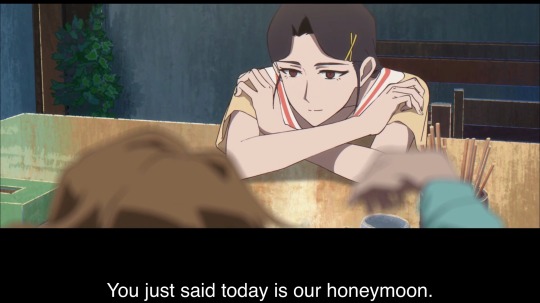
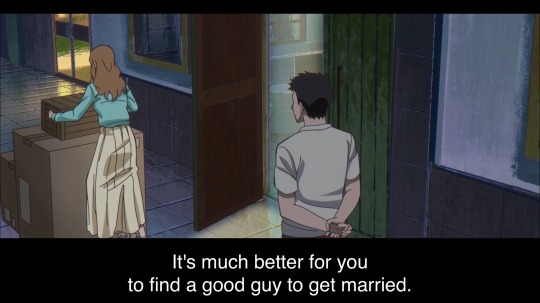
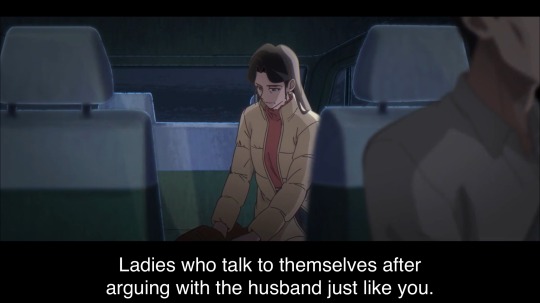
(may I remind everyone that the driver's comment was said when Cheng Xiaoshi was complaining about Lu Guang lmao)
They're telling us through "show don't tell" (for example, when Lin Zhen kept on eating the noodle despite knowing they'd kiss) and, also, connotations. They are presented to us as business partners, but then the entire episode goes on to tell us that there's more to them by tying their relationship to things percived as romantic. So what they want to really tell us is that beyond simple business partners, they're life-long partners.
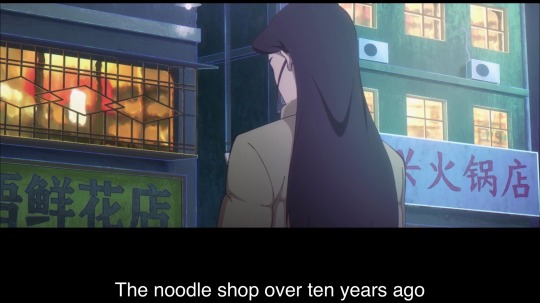
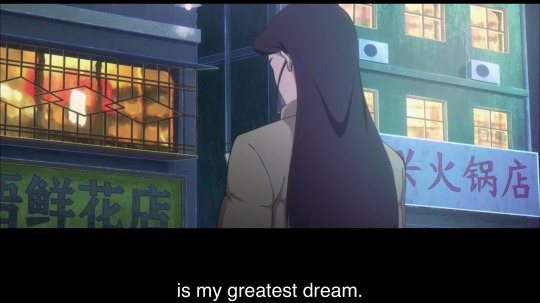
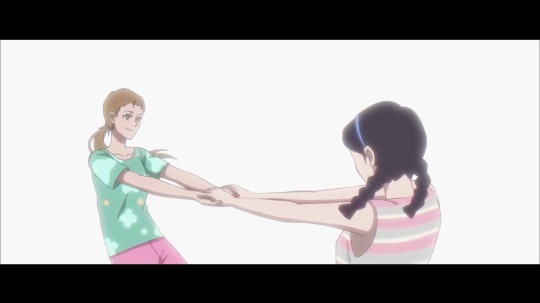
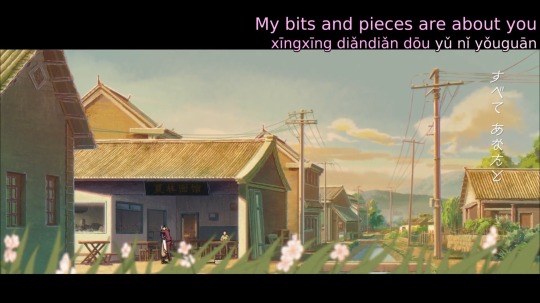
And then, after establishing this kind of connotation to the word partner, Cheng Xiaoshi says this to Lu Guang in the next episode:
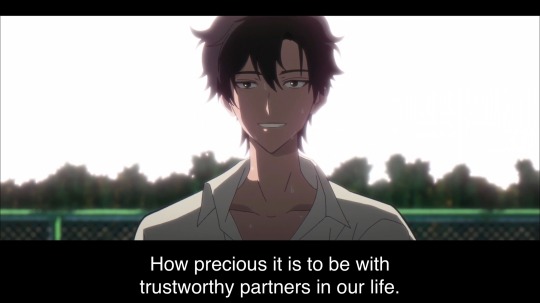
This doesn't stop at them. While it's the most obvious example, I think partnership in Link Click is intended to be seen as romantic, or at the very least dancing somewhere close to it. Let's go even further and take a look at our fully canon, heterosexual relationships and see briefly how their story is written:
1. Dong Yi and Xu Shanshan: both of them chose the comfort of each other's presence over moving on with their respective futures. Dong Yi had so much faith in their relationship and their love that he couldn't choose a life/future that didn't have Xu Shanshan - choosing to not go back to his family home nor go to that interview, and instead waiting for Xu Shanshan to define their relationship.
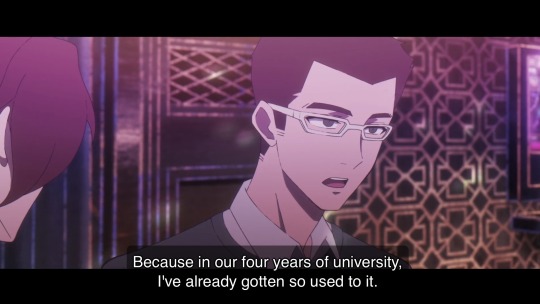
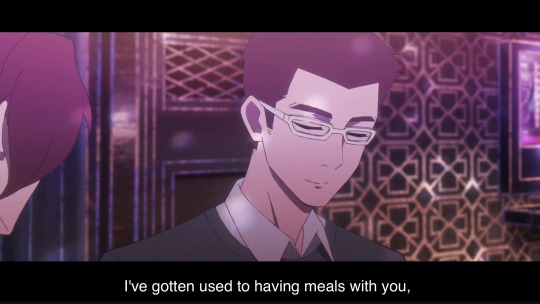
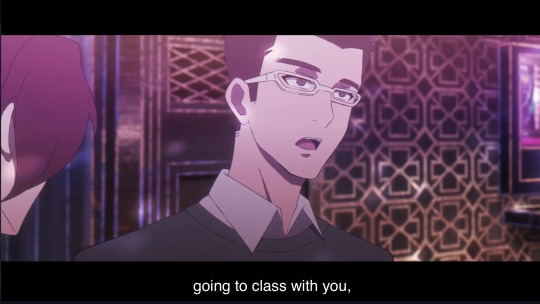
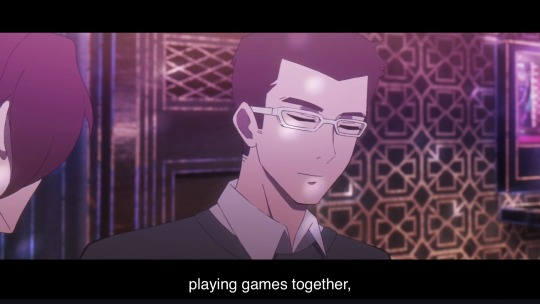
2. Liu Siwen and Ouyang: Siwen spent his entire life training with the purpose of getting his father-in-law's respect and marry Ouyang, going every year over and over to fight him. His perseverance and his undying love for her allowed Siwen to do the (seemingly) impossible.

3. Chen Bin and his wife: they're a tragedy. His wife understood Chen Bin the best, enduring feeling lonely because she loved him and wanted a future with him. But their relationship was cut short, so they promised each other to be together in a future life to make up for the time they wouldn't be in this one.
With this + the pictures I attached, it seems like Link Click has set this theme of "love is a life with you" for its romantic relationships, a partner that will fight to stay because they can't see a future that doesn't have their beloved. Going back to episode two, this applies even to the noodle ladies. When Yu Xia remembered what actually matters to her, she went back home - to the start, to her hometown. And, most importantly, to Lin Zhen.
So why is Shiguang romantic? Why aren't they queerplatonic, or just best friends, or bros or whatever else? Because besides what I said at the start of the previous paragraph, Shiguang's relationship mirrors a lot of the romantic ones. Each story and author writes romance and other kinds of relationships differently, portraying them in the way they perceive "this is what this kind of love is like". And beyond life-long partners, I think that the key elements of romantic relationships in Link Click are the ones I highlighted in bold above in the 3 canon relationships part - which Shiguang shares, too.
(I didn't mention this before with the het couples, but I find it a little amusing that season 2 happened because a man wanted to go to the past and get his wife back (still fuck you Qian Jin) and then we find out Lu Guang did go back to the past and got his boyfriend partner back lmao).
"Friend" vs "Partner"
So where is the boundary between platonic and romantic? What marks the difference between a (best) friend and a partner?
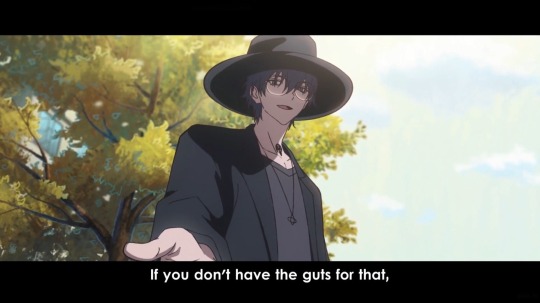
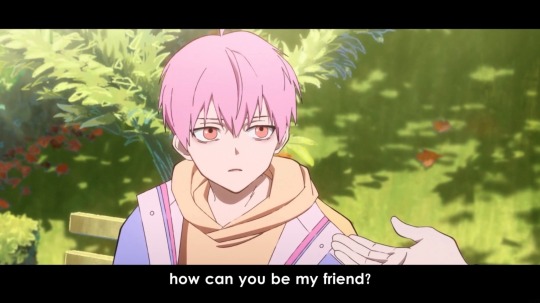
There is, for example, Liu Xiao and Li Tianchen's relationship. They aren't shown to have any kind of romantic undertones and there's even the very real possibility of manipulation on Liu Xiao's side. They're also never labeled as nor call each other partners, but instead Li Tianchen says he "met a new friend" and Liu Xiao says he's "going to meet an old friend" years later. So we could say for now that they have a somewhat close relationship (we see Li Tianchen go against Qian Jin to give the phone to Liu Xiao), but never cross that "friend" label.
We can even bring Qiao Ling and the boys' relationship. She's never labeled as a partner despite taking part in the side job and, more importantly, being super close to both of them. She is very important and a cherished friend to Shiguang, so why not call her partner too? I think it's intentional. Since she's been given a familial role already (calling Cheng Xiaoshi her brother when talking to Li Tianxi), she can't fill a partner role. I wonder why? because it's supposed to be a synonym for a romantic relationship. who said that.
So even best friends (Qiao Ling, arguably what Liu Xiao is to Li Tianchen) don't enter this close space that is being a partner. It's different, it's beyond platonic. Or at least that's what they've been showing us for the past two seasons.
I could go soo much more into this honestly, because I do think the little hints thrown here (the music videos) and there (tiny seemingly inconsequential details) are worth to be looked at too, but I wanted to get into the core reason that makes me go "woah so they're In Love fr". I hope I expressed myself well ^^
tldr; the series shows us a divide between having a (best) friend and a partner, giving "partners" romantic connotations.
209 notes
·
View notes
Photo
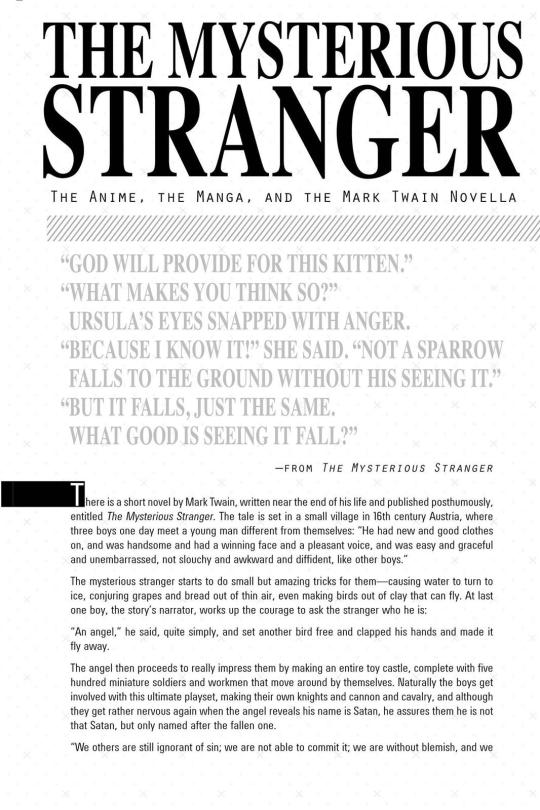
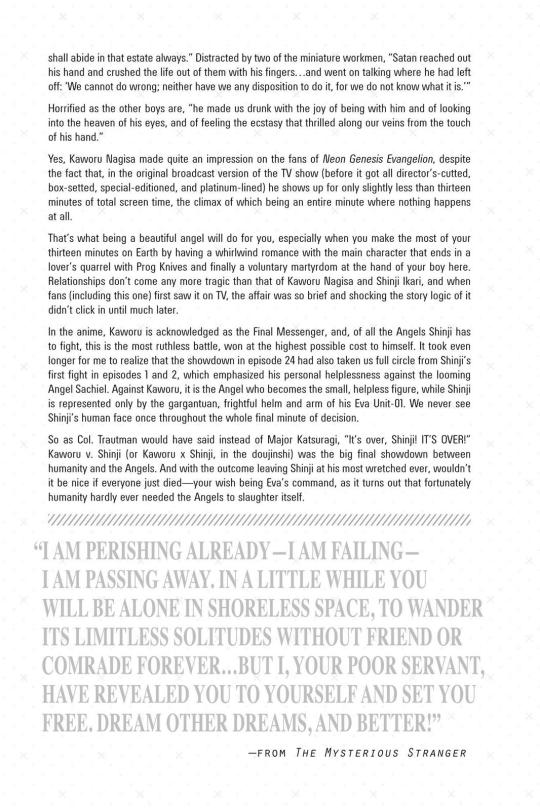
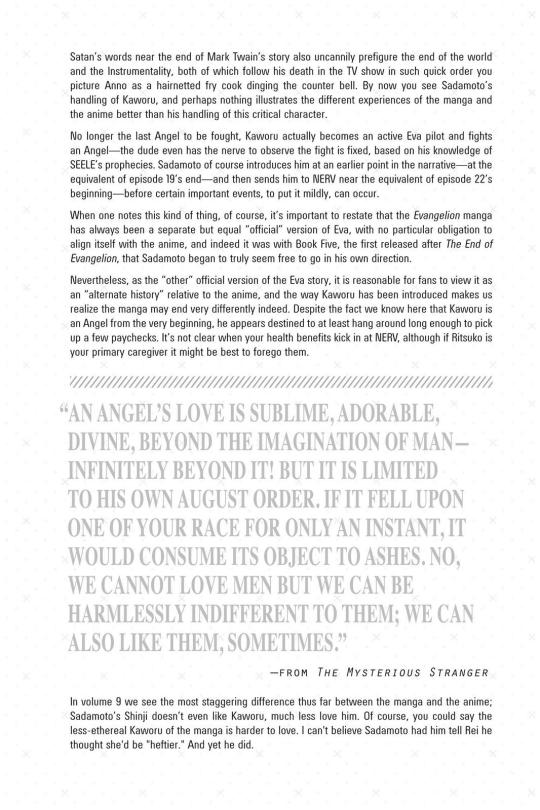

from neon genesis evangelion, vol. 12
The Mysterious Stranger
The Anime, the Manga, and the Mark Twain Novella
"God will provide for this kitten." "What makes you think so?" Ursula's eyes snapped with anger. "Because I know it!" she said. "Not a sparrow falls to the ground without His seeing it." "But it falls, just the same. What good is seeing it fall?"
—from The Mysterious Stranger
There is a short novel by Mark Twain, written near the end of his life and published posthumously, entitled The Mysterious Stranger. The tale is set in a small village in 16th century Austria, where three boys one day meet a young man different from themselves: "he had new and good clothes on, and was handsome and had a winning face and a pleasant voice, and was easy and graceful and unembarrassed, not slouchy and awkward and diffident, like other boys."
The mysterious stranger starts to do small but amazing tricks for them—causing water to turn to ice; conjuring grapes and bread out of air; even making birds that can fly out of clay. At last one boy, the story's narrator, works up the courage to ask the stranger who he is:
"'An angel,' he said, quite simply, and set another bird free and clapped his hands and made it flyaway."
The angel then proceeds to really impress them by making an entire toy castle, complete with five hundred miniature soldiers and workmen that move around by themselves. Naturally the boys get involved with this ultimate playset, making their own knights and cannon and cavalry, and although they get rather nervous again when the angel reveals his name is Satan, he assures them he is not that Satan, but only named after the fallen one.
"We others are still ignorant of sin; we are not able to commit it; we are without blemish, and we shall abide in that estate always." Distracted by two of the miniature workmen, "Satan reached out his hand and crushed the life out of them with his fingers... and went on talking where he had left off: 'We cannot do wrong; neither have we any disposition to do it, for we do not know what it is." Horrified as the other boys are, "he made us drunk with the joy of being with him and of looking into the heaven of his eyes, and of feeling the ecstasy that thrilled along our veins from the touch of his hand.'"
Yes, Kaworu Nagisa made quite an impression on the fans of Neon Genesis Evange/ion, despite the fact that, in the original broadcast version of the TV show (before it got all director's-cutted, box-setted, special-editioned, and platinum-lined) he shows up for only slightly less than thirteen minutes of total screen time, the climax of which being an entire minute where nothing happens at all.
That's what being a beautiful angel will do for you, especially when you make the most of your thirteen minutes on Earth by having a Whirlwind romance with the main character that ends in a lover's quarrel with Prog Knives and finally a voluntary martyrdom at the hand of your boy here. Relationships don't come any more tragic than that of Kaworu Nagisa and Shinji Ikari, and when fans (including this one) first saw it on TV, the affair was so brief and shocking the story logic of it didn't click in until much later.
In the anime, Kaworu is acknowledged as the Final Messenger, and, of all the Angels Shinji has to fight, this is the most ruthless battle, won at the highest possible cost to himself. It took even longer for me to realize that the showdown in episode 24 had also taken us full circle from Shinji's first fight in episodes 1 and 2, which emphasized his personal helplessness against the looming Angel Sachiel. Against Kaworu, it is the Angel who becomes the small, helpless figure, while Shinji is represented only by the gargantuan, frightful helm and arm of his Eva Unit-O1. We never see Shinji's human face once throughout the whole final minute of decision.
So as Col. Trautman would have said instead of Major Katsuragi, "It's over, Shinji! IT'S OVER!" Kaworu v. Shinji (or Kaworu x Shinji, in the doujinshi) was the big final showdown between humanity and the Angels. And with the outcome leaving Shinji at his most wretched ever, wouldn't it be nice if everyone just died—your wish being Eva's command, as it turns out that fortunately humanity hardly ever needed the Angels to slaughter itself.
"I am perishing already—I am failing—I am passing away. In a little while you will be alone in shoreless space, to wander its limitless solitudes without friend or comrade forever...But I, your poor servant, have revealed you to yourself and set you free. Dream other dreams, and better!"
—from The Mysterious Stranger
Satan's words near the end of Mark Twain's story also uncannily prefigure the end of the world and the Instrumentality project, both of which follow his death in the TV show in such quick order you picture Anno as a hairnetted fry cook dinging the counter bell. By now you see Sadamoto's handling of Kaworu, and perhaps nothing illustrates the different experiences of the manga and the anime better than his handling of this critical character.
No longer the last Angel to be fought, Kaworu actually becomes an active Eva pilot and fights an Angel—the dude even has the nerve to observe the fight is fixed, based on his knowledge of SEELE's prophecies. Sadamoto of course introduces him at an earlier point in the narrative—at the equivalent of episode 19's end—and then sends him to NERV near the equivalent of episode 22's beginning—before certain important events, to put it mildly, can occur. When one notes this kind of thing, of course, it's important to restate that the Evangelion manga has always been a separate but equal "official" version of Eva, with no particular obligation to align itself with the anime, and indeed it was with Book Five, the first released after The End of Evangelion, that Sadamoto began to truly seem free to go in his own direction.
Nevertheless, as the "other" official version of the Eva story, it is reasonable for fans to view it as an "alternate history" relative to the anime, and the way Kaworu has been introduced makes us realize the manga may end very differently indeed. Despite the fact we know here that Kaworu is an Angel from the very beginning, he appears destined to at least hang around long enough to pick up a few paychecks. It's not clear when your health benefits kick in at NERV, although if Ritsuko is your primary caregiver it might be best to forego them.
Sadamoto's remarks upon visiting the U.S. in 2003 indicated that the Eva manga might (might) be planned as a twelve-volume series in all. There is still plenty of room for speculation, as the slow working pace to which the artist himself often refers has of late become almost relativistic—as of this writing, it has been eight months since Sadamoto has drawn a new installment of Eva in Japan, and hence a Volume Ten is nowhere in sight. It may be small comfort, but those of you reading this are pretty much in the same drifting boat as the Japanese fans.
"An angel's love is sublime, adorable, divine, beyond the imagination of man—infinitely beyond it! But it is limited to his own august order. If it fell upon one of your race for only an instant, it would consume its object to ashes. No, we cannot love men but we can be harmlessly indifferent to them; we can also like them, sometimes."
—from The Mysterious Stranger
And with Book Nine we see the most staggering difference thus far between the manga and the anime; Sadamoto's Shinji doesn't even like Kaworu, much less love him. Of course, you could say the less-ethereal Kaworu of the manga is harder to love. I can't believe Sadamoto had him tell Rei he thought she'd be "heftier." And yet he did.
I don't think any A.T. Fields actually got penetrated in the anime; while I do think Shinji felt sexually attracted to Kaworu, and that you the audience are supposed to feel that he felt it, what Kaworu himself thought was a very different matter. Like Rei, I believe Kaworu to be innocent—coyly, he appears not to be so, because while Rei needed to be reached out to, Kaworu has come to reach out; whereas Rei has spent her existence being observed; Kaworu has come to observe.
Indeed, in the manga, Shinji's irritation about Kaworu's invasion of his personal space seems almost a parody of his attitude in the anime. In the TV show, when Kaworu put his hand on Shinji's, he flinched but did not pull away; whereas in the manga it's easy to imagine Shinji slugging him. Instead he goes to run after Rei, hoping to get closer to her again.
I hardly think the change reflects any phobia on Sadamoto's part (after all, we even get to see Shinji's "Unit One" in the manga), but the fact the manga Shinji is less emotionally bleak and empty, and hence less vulnerable. Shinji's just as negative in the manga, of course, but it's an active variety, rather than the passive negative creep (in the best Nirvana song sense) we know from the anime. We don't have to imagine him slugging Gendo; from the look of surprise on Dad's face in Book Seven he would have smacked the beard off his face if Kaji hadn't stopped him.
Neither is Shinji in a positive emotional situation where we leave him here, either; indeed at this point in the manga there's arguably no one he can turn to—the more brutal fate that befell Toji has cut him off from his school friends, Rei has become hesitant, Kaji is dead, and his perennial self-esteem booster Asuka is going to need to rebuild her internal supply before she can even get back to calling him a loser and idiot.
So, like Misato trying to put her own hand on Shinji's, all I can do for now while we wait for Sadamoto-sensei is to recommend for your winter vacation reading list The Mysterious Stranger, which I can almost guarantee will give you new angles to think about Kaworu, and may even earn you class credit besides. A quick look at the novel's comments on Amazon list a teacher who says fundamentalist students walked out of his class when he taught it; another compares it to The Matrix; those who dislike it call it "sick," "bitter," and "twisted." Sounds like good old Evangelion to me!
—Carl Gustav Horn
[a drawing of Kaworu holding a kitten]
Although The Mysterious Stranger can also be found in a number of print editions, including The Portable Mark Twain from Penguin (haw haw), the story, being from the days when mp3s came on shellacked cylinders, is legally available online at http://etext.lib.virginia.edu/toc/modeng/public/TwaMyst.html. The same site has a book called The Holy Bible, King James Version, which fans of Evangelion might also enjoy, although it's technically "Editor's Choice."
33 notes
·
View notes
Note
Hello, A! So I was wondering do you have any headcannons about how you and B were like at Wammy's together? PS. I thought dead men tell no tales lol (sorry about the joke if you didn't like it)
// Oh do I ever... Alternative has such potential to highlight things about B’s character that develops him into the killer of Mello’s novel. The lore surrounding the first generation (and the notion of Mello writing about a dead successor that previously filled his position - his predecessor) is more poignant than I think it was intended to come across but here are some headcanons~
Wammys House:
A & B are the first to receive their secondary alias after which it becomes a kind of right of passage for other successors, choosing their own (though often not official) - to A & B, only theirs will ever be legitimate.
A is introduced to B after only 1-2 years of being at the house
A, before becoming a letter, was taken into Wammy’s due to his intellect but only later is selected as the first attempted L-backup, probably pulled from a satellite home
Alternative & Backup (A’s perspective):
His introduction to B is a pivotal moment for him. After so much loss, he sees this as an opportunity for redemption and a return to a clear path forward, and now it is under threat. B represents for A the physical manifestation apathetic fate, he is foreign in every sense, they cannot even communicate when they are initially introduced. His presence signifies A’s disposability - B is the backup plan for when A fails, like a vulture circling over head, it looms over him like a prophesy he is trying to outrun.. though, B can also overtake him at anytime, relegating him to a future that, from A’s perspective, is neither known nor the success story that he has put so much hope in. The world for Alternative at this point in his life is an unreasonable and precarious place. All he knows, up to this point as a seven year old, is that everything is fragile and must be hard won - and there is no guarantee that one can keep what they have fought or sacrificed to obtain. --- after all, he is in line to replace L and L is about as far from vulnerable as he believes a person can get --- Maybe, B also represents a challenge that requires a level of maturity that he does not yet possess - the inevitable dilemma, that this position is of such consequence to the world, that it needs the best person for it, — and that may not be him...
There is nothing genuine in the sweet smile.
The way he extends an open hand, how his soft, his boyish voice offering “ Hello, Alternative ” …
A feels an unpleasant sensation snake up his spine like a fever’s chill, empathetic aptitude ringing in his ears with all the incongruence rolling off this boy.
His gentleness feels scripted, words trilling out of his mouth- practiced and angular; absolutely, wholly contrived. A has never meet anyone with such an emptiness in their words and actions…
A returns the greeting with a stony, silent stare - I know what you are.
They slide up from the open palm to meet the foreign boy’s gaze - Blue eyes resting soft, knowing and stormy, heaven’s skies empty of angels. Alternative is standing his ground, refusing to pretend they are not here for a reason, telling himself, “I’m not afraid…”
But, he has never seen anyone with such deep eyes.
They are the windows into an empty soul, a black abyss, absolutely apocalyptic…
Alternative is capricious in his treatment of B, vacillating between animosity and empathy- at times he’s even conspiratorial , allying himself with B and undermining their superiors- beginning to identify with B (even in spite of the language barriers). Backup is clever and naïve and careless, and unreserved in a way that A wishes he felt safe to be. B is the only one that can truly grasp what he is going through but he is also very strange... -- Alternative struggles with trials & setbacks that roll off Backup’s back with ease. B is several years into his understanding of his eyes and it shapes how he moves through the world, what he feels is worth his pain, what ultimately just doesn’t matter. A is, in some ways, what B might have become if he were a little more ignorant, spared the ever present reminder that this is all so temporary.
Alternative has many faces that none are as acutely aware of as B- it is why he doesn’t take the quips and backhanded apologies personally. Alternative’s identity has been tailored to his circumstances — so much of it he had to leave behind to become this -- to his superiors, he is mature, disciplined and motivated -- exemplary if not a bit too austere. To those that benefit him, he is considerate and trustworthy- and honest. To those that he fears will take advantage of him, he is an arrogant and harsh - conniving and spoiled. When he is caught without a persona on hand, he is awkward, reclusive, and reserved. Despite this, his cardinal traits are eloquence and persistence, he thinks deeply about his place in the world and who he should be but not enough on who he is — Only B is audience to moments when he is short sighted and immature, when he is undone or humiliated - when he is elated or truly.. afraid of what lay ahead of them. When he is sick or less than who he wants to present himself as, B has been there whether he wanted him to be or not.
Alternative is attracted to B though it is initially a disquieting realization, one even he doesn’t entirely understand. It isn’t that B is unusually good looking or charming — though perhaps A has peculiar tastes that B unintentionally satisfies (I can’t imagine him actually trying)... The level of intimacy involved in knowing someone this long, on such a personal and inescapable level has made B a source of unwavering acceptance, — because he had to be. The alternative would have been sleeping next to someone he would gradually come to despise any who really wants to live that way? Yet, B comes to represent stability and unconditional regard that feels a lot like love. There is a fraternal element to it in that B anchors who he is. B is someone that has a history with him that hasn’t been erased or eroded -- that contradicts A’s perception of the world as fragile or finite - it is comforting to have something seemingly permanent ... and terrifying that he cannot start anew, if he doesn’t like who he is and cannot be hidden in the obscurity that L enjoys.
When B begins to insinuate an interest in something more, A is not initially receptive and becomes genuinely distressed. This doesn’t translate with any logical sense to B, who believes it’s born out of A’s latent fears of realizing his own sexuality... But, by the time they are entering late adolescence, A is more concerned with the prospect of romance and that becoming L is destined to be a lonely path. He sees their childhood in it’s twilight as a tragic loss that cannot be reclaimed or rewritten, and B’s subtle advances as destructive to the purity of their friendship -- but he can’t stay a child forever even if he feels a sense of unfinished business surrounding it and he can’t keep B there either... It takes B’s attention shifting elsewhere for A to begin softening to the idea that B isn't ruining what's between them but expanding on it.
Alternative has experienced depression -- at some point he was prescribed SSRIs, as a part of basic care for successors. While it does alleviate the depth of his lows, he begins to worry that it is dulling the sharpness of his mind, which he has come to see as central to his self-worth. It may have no foundation in reality but A develops an inconsistent relationship with any medication prescribed to him out of those fears. In the end, - there are some things medicine cannot fix...
A few other small things:
- A loves the smell of lavender and grass, it reminds him of his home though as he gets older this memory is more elusive and he begins to wonder if they memories from funeral flowers or even if they are impressions left over from a dreams.. did he even attend his parents funeral?
- A knows they aren’t allowed to take pictures of each other in Wammy’s for good reason but when Y sneaks a camera into the house one summer evening, he is can’t deny there is something precious about having pictures of B perched on the railing of the back steps - his hair sweep by the wind just as he turns his eyes to look, soft unfocused, — like the tender look he gives him just as he wakes up in the morning before he remembers who they are. A traces the lines of his face while lying beneath his bed, where he tucks it between the boards. It’s only a few years later that he will see how much his friend has matured. -- B hates photographs and will place them face down when they go into Roger’s office. Roger has never understood why.
- A drinks his coffee and tea black as tar. B thinks it is terribly bitter but will bring it to him anyway, unaltered. There is something uniquely enjoyable in knowing that B doesn’t need to be told what he likes~
- A is borderline masochistic though perhaps only B has any inkling of it. He would probably never acknowledge it openly... it is degrading to get a charge out of being hurt.
- A loses his faith around age 10 but still believes that he might as well act as though there is a purpose in being good and not just adept and ruthless. The only alternative, from A’s perspective, is to believe that everything he has been through meant nothing and he will ultimately change nothing. And, that may be too painful a philosophy for him to embrace.
- A’s worst injury occurred when he was deliberately shoved off the roof by an irate B ( thatvhe provoked). While it was a watershed event for A coming so close to death and experiencing the consequences of pushing B beyond that point of caring about consequences... For Backup, this a was also critically informative event, an exercise proving the numbers were infallible -- he was genuinely surprised that A survived the fall and, to a greater degree, surprised that he felt regret in having done it ... left alone in their room to wonder for days, searching for the contraband pictures from that summer A had hidden that could prove if A was even still alive....
34 notes
·
View notes
Photo
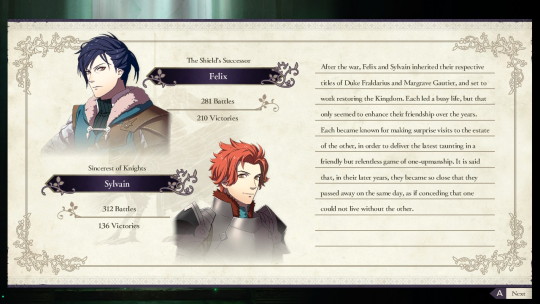


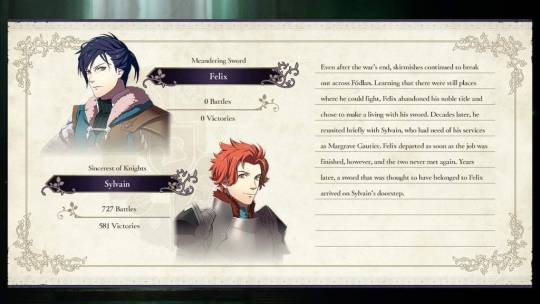
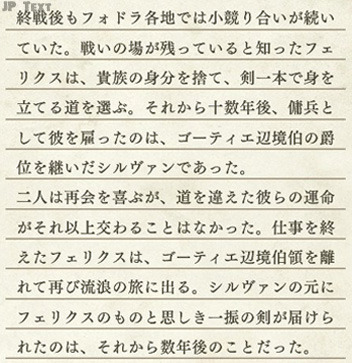

Translation + Analysis of Sylvain and Felix’s Paired Endings
Covering both their AM and non-AM endings, originally posted on Twitter.
Bonus: Discussion about Felix’s Meandering Sword title.
Azure Moon Paired Ending
HONESTLY I FEEL I SHOULD JUST PACK MY BAGS AND GO... The JP version has plenty of subtext but the EN version just blows stuff outta water and takes the lines further than what the JP version already has.
I personally am incapable of topping the way they handled everything and my translation feels so watered down, even if it's pretty close to what the original actually is, ahaha. But I think the JP version is still worth a look, considering how EN glossed over some details in favor of being more romantic, in a way?
One is the specificity of when Sylvain took the Margrave title (aka after his father died). Another is detailing the existence of a Gautier castle, and the detailing of what these two actually did with regard to this "relentless game of one-upmanship."
Like so:
Felix, visiting Sylvain: "/Fuck/ you" Sylvain, visiting Felix: "Fuck /you/"
Or so I imagine it, aha. But yeah, in other regards, the localization really ran away with the wording in JP, notably with "Each led a busy life, but that only seemed to enhance their friendship over the years." and "as if conceding that one could not live without the other."
The JP version did not go that far. Maybe the localization team has a pet bias for Sylvix...? I don't think the changes are unwarranted in any case, it adds a lot of nice flavor to the text!
Friendzoned as they are in this ending card, we all know that's FE code for "yes they were very gay for each other" so take the ending as you will!
Non-AM Paired Ending
THERE'S NO HAPPINESS TO BE FOUND IN THIS ENDING it just tore my heart into a million pieces and I'm--ahem, okay, let me try to get this show on the road before I start crying needlessly over this ending again.
In contrast to the way the localization handled Sylvain and Felix's AM paired ending, they decided to go with a more subdued route in the localization, but the original JP just has so much depressing meat in it that's interesting to poke at, so here goes...!
「捨てる」 (suteru = to throw away/discard/abandon), I feel is such a strong word to use, though that's in part to my personal associations with the word, perhaps. That verb can definitely be used in relation to renouncing one's title, and is not unnatural at all in that context!
But as a common verb, I just often associate it with "throwing away trash" so it just hurt me in a weird way, but that's probably just me. A friend associates it with "letting go", which I think is a more eloquent way to put what I feel about the use of this word here.
Felix, having chosen this path as a wandering swordsman, has no need of his noble title any more. A noble title symbolic of his connection to Dimitri, who had passed away during the course of the war Felix has fought and lived through.
Felix is a vassal without a liege, a shield with no one to protect. This course of action he takes seems to imply that he thinks there's no point to becoming "Duke Fraldarius" or the "Shield of Faerghus" in a route where Dimitri is dead.
So instead, Felix severs his ties with it--his past, his supposed destiny. Left it behind to seek a place where he could die, just as a ronin might do without his master. A matter that is similarly referenced in his non-AM ending with Mercedes.
I am using samurai references here again because in JP, Felix is a walking samurai trope. He usually speaks like one in battles and in reference to seeking worthy opponents, which kinda comes off as pretty edgy at times.
I mean, all those flowery references to his blade and cutting people down and swordsmen can sound pretty extra in my honest opinion, but that's a tangent.
And speaking of Felix fitting the ronin archetype, "Meandering Sword" is written as 「流浪の剣」(rurou no ken) which has the 「浪」 in ronin, which is written as 「浪人」. Take that as you will.
Digging in even deeper, the kanji 「浪」 is the character for wave, and for me it evokes the feeling of being adrift, of going where the tide takes you. It definitely is the root for a lot of words that have to do with the word "wandering".
In fact, my alternative way of translating his title is "Wandering Sword". Which I think is more telling of what he did after he abandoned his noble title and the kind of occupation he took, but admittedly "meandering" has a pretty sweet ring to it that does seem appropriate in this context.
Also, I'm probably reaching so hard, but his title in JP, "Rurou no Ken", sounds a lot like "Rurouni Kenshin", an old, classic manga and anime series about a swordsman that takes up a life of vagrancy after his bloody involvement in a "war" of a kind (revolution, in his case).
Though Kenshin's and Felix's paths differ wildly, especially with Kenshin's vow not to take another life, I can't help but wonder if Felix's title is an ironic nod to that... especially when I tend to presume that Felix living by his sword means he uses it to protect people.
Despite the whole mercenary deal, I feel one condition that Felix attaches to his jobs is that it has to be in line with protecting the weak and innocent. But that's all in the realm of headcanon!
But yeah, waxing poetic about Felix's end card title aside, some lines were cut and changed, I think the most notable here is "ten-odd years" became "decades later" in English. Also, EN chopped off the part about how happy Sylvain and Felix were to be reunited.
Probably because it leads right into Felix leaving anyway and them never meeting each other again, the way it was phrased in JP made them sound so star-crossed that it really, really hurts to think about.
The way they just drop 「運命」(unmei) right there... like it's destiny that they are not to meet again after that reunion... it's just really crushing to read.
Then the last part just twists the knife right in, with Felix's sword making it back to Sylvain a few years later. In the context of this story, there's only one way to read this.
Felix, the meandering sword without a master, has found a place to die. His sword is a memento, all that's left to pass on to those who yet live.
As to whether Felix himself asked that his sword be brought back to Sylvain, or if whoever got hold of it knew it's got to go to Sylvain, we'll never know, but the fact is, the sword makes it back to Sylvain.
Which is oddly touching when you think about the fact that, for a wandering swordsman like Felix, his sword is his most precious possession. It didn't find its way back to Fraldarius territory, to where his uncle or relatives are likely still are.
It found its way back to /Sylvain/, who, perhaps, always held a certain torch for Felix this whole time. Watching, hoping their paths would cross again despite Felix's willingness to just leave him after their reunion. But fate has other plans, and all Sylvain has left of Felix is this sword bequeathed to him. Perhaps, a will, you can even say. Or a sentiment Felix has never been able to properly return in his lifetime.
This is Sylvain and Felix's tragic love story in this route. A story of parting, fleeting happiness, and a promise broken. All that's left for Sylvain now, is to either follow after Felix or carry on by his lonesome, with Felix's sword by his side.
Original Posts:
AM Ending: https://twitter.com/slip_fe3h/status/1205817451595722754
Non-AM Ending: https://twitter.com/slip_fe3h/status/1206000144929345536
#fire emblem: three houses#sylvix#felix hugo fraldarius#sylvain jose gautier#fire emblem#my translation#just my two cents
47 notes
·
View notes
Text
Drama CD Metal Gear Solid interviews
The following is a series of interviews that were published in the booklets for the Drama CD Metal Gear Solid series. The booklet for Vol. 1 contains an interview with Hideo Kojima himself, while Vol. 2 contains interview with Motosada Mori (the series’s military advisor, who served as the audio drama’s screenwriter as well) and illustrator Yoji Shinkawa. The scripts for the Metal Gear Solid radio drama has been translated for quite a long time now, but the interviews have not until now.
The Metal Gear Solid radio drama is a non-canonical continuation of the game in which Solid Snake, Meryl Silverburgh, Roy Campbell and Mei-Ling continue working for the U.S. military following the events of the Shadow Moses island takeover as they become involved in new missions set in various conflict zones. You can read a translated transcripts on the following links: Vol. 1 and Vol. 2.
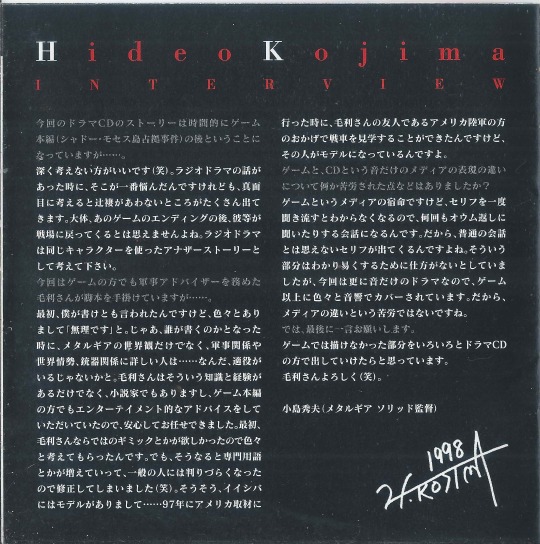
Hideo Kojima
It seems that the story for the Drama CD is set after the events of the game itself.
Don’t think about it too deeply. (laughs) That was my biggest concern when it came to discuss the radio drama. There are quite a few inconsistencies if you think about it seriously. More importantly, I don’t think they [the main characters] would be willing to return to the battlefield after the ending of the game. You’re better off thinking of this audio drama as an alternate story using the same characters.
Mr. Motosada Mori, who worked on the game as a military advisor, seems to had been in charge of writing the script this time...
Originally I was told to write it myself but I wasn’t able to due to various circumstances. So when it came on deciding a writer, it had to be someone who was not only be knowledgeable of the Metal Gear universe, but also be familiar with military and world affairs, as well as firearms... I was wondering if there was such a worthy candidate. Not only does Mr. Mori has the expertise and experience, but he is also a published author. On top of that, he provided entertainment advice on the game itself, so I was confident to assign the job to him. At first I wanted Mr. Mori to employ his own unique gimmick and we thought a lot of what he could add to the script. But then the amount of technical terms he added to the script became too much for the average listener to understand, so we ended up reducing them. (laughs)
By the way, the character of Allen Iishiba was based on someone we knew... When we went to the United States for research, we were able to observe a tank in person thanks to a friend of Mr. Mori in the U.S. Army, so he became the inspiration for that character. [Translator’s note: The person in particular is Tomoaki Iishiba, who is credited as one of the military advisors alongside a Michael Allen.]
Were there any difficulties when it came to the difference in expression between a videogame and an audio-only CD?
Perhaps this is the fate of videogames as a medium, but there is a chance that if you only hear a line of dialogue once, you might not understand it the first time, so we have to repeat things like a parrot during conversations. [Translator’s note: This is why most conversations in the MGS series end with Snake repeating what the other person said in the form of a question] As a result, we end up writing dialogue that would seem out of place in a normal conversation. We had no choice but to write like that in order to make the game easier to understand, but because this is purely an audio drama this time, it covers more acoustics than the game itself. Therefore, the difference between the mediums was not a problem at all.
Finally, can you give us any last words?
I think that the Drama CD will depict a lot of things that could not be done in a videogame. Give Mr. Mori my regards. (laughs)

Motosada Mori
You worked as a military advisor in the original Metal Gear Solid game, but this time you’re writing the screenplay...
I actually played Policenauts when it was first released, so my feelings are rather complicated. I became a fan of Kojima because of Policenauts. While observing the game’s development process, I thought many times about how it would be like to be one of the players anticipating its release. Putting it in another way, I might be wondering if it was going to be a good game and I would wish to play it without knowing anything about it... (laughs) If there is ever a next game, I want to be just a player.
This time you’re working on an audio drama. Did that present any difficulties?
How to depict the world of Metal Gear without the use of visuals? That was the biggest challenge. Moreover, whether you’re listening to just one episode or the one that comes after, you have to write them like a single storyline. On top of that, I intended to write a drama that would appeal to both, people who played the original game and those that didn’t. Nonetheless, it was difficult. Writing the screenplay was an everyday hell. Basically, the story takes place after the events of the game, but like Mr. Kojima said, writing a story that follows the ending of that game was the best opportunity to show off my skills. To what extend can you demonstrate a unique worldview? The results is a kind of progression that proceeds from the video game to the audio drama and vice-versa.
Were there any instances where you based the story or characters on your experience?
Most of the incidents, including the characters who appear in it, are fictional, but some of it is partly based on my own experiences. For example, is it possible to distinguish between good and evil on the battlefield? The characters in this story, like Schultz, Cortez and Ivanovich, all act in their own interests, believe in themselves and try to justify their means. It’s a rule that doesn’t work at all on a normal society, but somehow you can get away with on the battlefield. Those with power seize everything. This is a drama about tragic men who were drunk on a power struggle and were conversely swallowed into it.
Finally, can you give us a few last words?
Enjoy this audio drama and let us know what you think! I want to make the best use [of your feedback] next time... Will there be even be a next time, Mr. Kojima?

Yoji Shinkawa
There are many characters being drawn for the first time for the Drama CD. What kind of mood do you usually have when you design a character?
My creation method varies depending on the character. For Allen Iishiba... well, he was modeled after a real person. (laughs) He was actually a gentle guy, but he became a bit scary in the artwork that I drew.
For Sergei Ivanovich, I originally drew him as an older man in his 50s or 60s, but then Mr. Kojima requested him to be “a younger and cooler type.” When I asked him what kind of feeling he wanted from the character, he answered “someone like Tony Redwood [a character from Policenauts].” I then drew him younger, but he still didn’t stand out, so I wanted him to hold a small arm. I asked Mr. Mori if it was alright if he was holding a knife and he answered that was fine. It’s the same feeling I had when working with Mr. Kojima.
The image of Marc Cortez was that of a brave soldier with a decisive military history. However, since he is a character of questionable allegiance, I gave him a hat that obscured his eyes in order to make him look very suspicious. Maybe it’s just like Roy Campbell and his beret or Master Miller and his sunglasses. Can you recognize a character with just that [an accessory] alone?
The familiar characters from the original game all appear in new outfits here too. Especially Meryl Silverburgh, who looks cool in her sneaking suit!
After the Metal Gear Solid game finished development, I wanted to have [Meryl wear the sneaking suit] and did a drawing. It felt quite right, so I asked Mr. Mori about it. She’s armed with just a single Desert Eagle pistol, so she would need the infinite ammo bandanna to match Solid Snake... (laughs). Just kidding about that. I wanted Meryl to be depicted much closer to her namesake from Policenauts.
Speaking of weapons, there’s seems to be quite an elaboration on them in this Drama CD...
That’s right! Even the AKM assault rifles wielded by the bad guys was chosen by Mr. Mori. I’m pretty sure it was his choice. I always think of the visuals first in my case. We had a few meetings before producing the Drama CD and I was surprised when they brought in an AKM without any prior announcement, as it was very different from how I was imagining it. But it was fun to collect reference materials. I was grinning while drawing them.
12 notes
·
View notes
Text
2019: My year in K-Dramas - Part 1
I’ve been getting into kdramas for a few years now, but I usually only watch one or two at a time. This year I watched a lot more (and that’s not counting The Bride of Habaek, which I dropped when it became clear it was a very bad adaptation of the manhwa; Crash Landing on You, which started airing a couple of weeks ago; nor Tomorrow With You, which I haven’t yet finished, what’s probably not a good sign), a few being rewatchs of old shows that I like. Seeing as it’s unlikely I’ll ever write up full reviews for each like I did for Goblin (you can read my review here), I decided to compile this list to tell you what I liked and didn’t like about each, what I feel worked and what didn’t. I’m also including a qualitative metric (Rewatch meter) that tries to gauge how likely it is that I’ll find myself returning to the show in the future (Low, Medium, High). Naturally, your very own meter may differ from mine.
For future reference, these are the shows I watched in 2019 and that I aim to cover in this series of posts:
While You Were Sleeping (2017)
W (2016)
My Strange Hero (2018)
The Secret Life of my Secretary (2019)
Angel’s Last Mission: Love (2019)
Strong Woman Do Bong-Soon (2017)
When the Camellia Blooms (2019)
Bring it on, Ghost (2016)
One More Time (2016)
My Girlfriend is a Gumiho (2010)
My Love From The Star (2014)
Descendants of the Sun (2016)
Regardless of which show did better, overall, I find myself drifting more and more towards Korean dramas than your run-of-the-mill American TV show, save for a few bright exceptions, such as The Expanse. Heck, they’re better than most Hollywood movies nowadays.
Since I’ll probably end up writing a lot, I’ve decided to split this review list into two parts. Let’s start with the last kdrama I watched and work my way backwards... if I can remember, that is.
WARNING! There will be spoilers so read at your own risk.
While You Were Sleeping (2017)
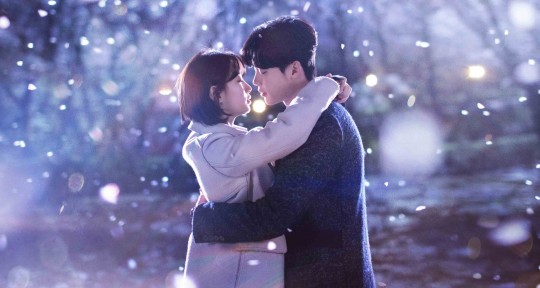
Bae Suzy as Nam Hong-Joo, and Lee Jong-Suk as Jung Jae-Chan.
Release Date: September 27 - November 16, 2017
Episodes: 16
Available on: Viki
Summary: Nam Hong-Joo is a young journalist who has had bad dreams about the future since she was a kid, but she has never been able to change the outcome. Jung Jae-Chan is a rookie prosecutor who moves in across the street with his younger brother. When Jae-Chan has a prophetic dream of his own about Hong-Joo being involved in a car accident, and the tragic events that follow, he makes an impulsive decision to interfere, changing Hong-Joo’s fate and that of police officer Han Woo-Tak in the process. When the three of them start having dreams of one another, they realize their lives are somehow entwined. Together, they decide to use their knowledge of the future for good, but changing someone’s fate is never straightforward, and the consequences for doing so may be more than they can handle.
What I liked:
The concept and writing. This is the second show I’ve watched, in chronological order, with Lee Jong-Suk as a lead where I’m really attracted by the concept. Imagine if you could take the precogs from Minority Report and give them (relatively) normal lives inside a kdrama. This is the result. Even better, having Hong-Joo and Woo-Tak have different and often contradicting dreams about the future makes for an interesting twist, as we see prosecutor Jae-Chan struggling to navigate these prophetic waters in search for the best outcome. Curiously, the show makes a point early on about how Jae-Chan’s the variable upon which their dreams diverge, but nothing really comes off it. Naturally, the concept of multiple diverging futures gives the show’s cinematography a chance to play around a bit, often comparing the same event in alternative timelines, or in the same timeline but at different moments in time. It may sound complicated, but it’s pretty to grasp once you start watching. Furthermore, the writing’s pretty tight all around, what’s not a mean feat when you’re juggling multiple realities, with some very emotional payoffs as the show draws to a close. Perhaps its weakest point is exactly how this prophetic dream ability is transferred from person to person (a theory is put forward which doesn’t entirely convince me), and the unnerving (and unexplored, fortunately) implications should someone less honourable were to have these dreams.
youtube
When The Nightmares Started. This is the best track in the entire show and if it’s not the main theme, it damn well should be. It has moments of calm, a hint of romance and hope, and that awesome shit-is-about-to-get-real cue starting at 1:38 that never fails to make a scene tons more epic. Your dish-washing experience will be 100% more epic playing to this track, guaranteed!
The Justice League (and friends). This show could’ve probably gotten on my bad side real fast if it had created a villain with the same superpower as the heroes (depends on the execution to be honest) and, indeed, I thought that was the direction it would inevitably take, revealing at some point that (evil) defense attorney Lee Yoo-Beom also had prophetic dreams and had been using them for his benefit all along, muahahaha! Instead, the show gave us three average people, connected by their prophetic dreams, who decide to team up and use these visions for good. It’s not always easy to change the future, as it has many ramifications, and therein lies the show’s narrative potential that it manages to exploit, perchance to its fullest. Even in the very last episode there’s a hint that maybe the people they’ve helped throughout also have dreams of their own that they use to help others, sort of a pay-it-forward chain. It may be somewhat unrealistic, but it’s a good note to end the show on all the same.
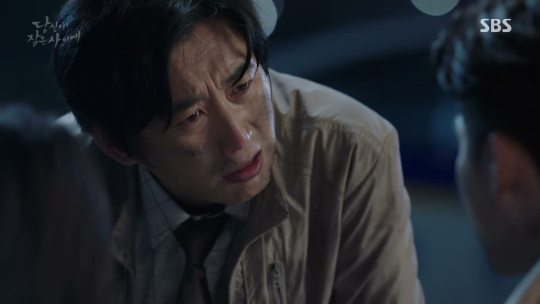
Kim Won-Hae as Choi Dam-Dong. Easily the best supporting character in the show, delivering a stronger and more rewarding performance than in Strong Woman Do Bong Soon, where he played two characters (he was pretty funny as the over-the-top head of development planning at Ainsoft), veering towards the more serious/dramatic/emotional end of the spectrum, although with some comedic elements mixed in. I was surprised by how strong his arc turned out to be, and my respect for his character went up by several points when his arc comes to a close and we finally put all the pieces of the puzzle together. This man can do both comedy and drama, so kudos to him.
What I didn’t like:
Mr. Perfect (also known as Han Woo-Tak). It’s not that I dislike him, far from it. Woo-Tak is so good, smart, selfless, and even good-looking, that he kinda undermines the OTP just by existing. He’s really setting unreasonable standards for any man to compete against. I mean, he even plays Cupid for the OTP... while also being in love with Hong-Joo! On the plus side, the show doesn’t really try to push the romantic triangle angle, what usually has mixed results. The one thing I did mind is how the show hints at him potentially being a better attorney/prosecutor than the main lead since that’s kind of Jae-Chan’s thing. I mean, if you take everything that makes the lead special and give it to someone else, is he still the lead?
OTP: A stronger performance from Lee Jong-Suk than in W, complemented by a relatively (and I cannot stress this word enough) weaker performance by Suzy in some aspects (I think Han Hyo-Joon’s Oh Yeon-Joo in W does sad love better than Suzy as Nam Hong-Joo, but it’s a matter of preference), results in a better pairing with more chemistry. Suzy is great and lovable at being the quirky Nam Hong-Joo (watch the video below if you’re unconvinced) and Jung Jae-Chan is a lot more vulnerable than Kang Chul ever was, but I was left wondering at times whether this couple would’ve gotten as much traction were it not for the strength of their past connection (especially with Mr. Perfect around).
youtube
Verdict: What can I say? While You Were Sleeping was an excellent show from beginning to end. If I were to nitpick, I would’ve chosen the end wedding to be the one between Jae-Chan and Hong-Joo since that honestly makes more sense, and maybe I would’ve made Woo-Tak more of a bro than a somewhat-but-not-entirely romantic rival (think Seo Dae-Young in Descendants of the Sun).
Rewatch meter: High
W (2016)
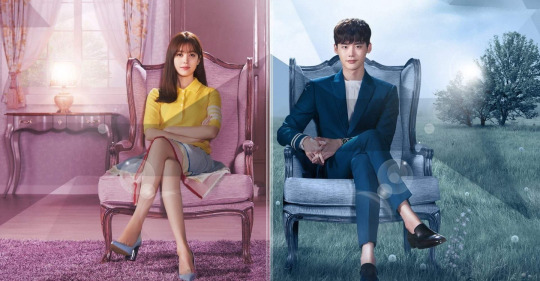
Han Hyo-Joo as Oh Yeon-Joo, and Lee Jong-Suk as Kang Chul.
Release Date: July 20 - September 14, 2016
Episodes: 16
Available on: Viki
Summary: W is a bestselling webtoon by cartoonist Oh Seong-Moo that follows the adventures of Kang Chul, an Olympic gold medalist framed for the murder of his family, who’s eventually acquitted and becomes a multi-millionaire who fights crime (think Bruce Wayne but without the costume). Tired of his creation, Seong-Moo decides it’s time to kill the protagonist and put an end to the series (much like Sir Arthur Conan Doyle decided to kill Sherlock Holmes at the Reichenbach Falls). Oh Yeon-Joo is Seong-Moo’s daughter, a doctor and passionate fan of W, who is one day mysteriously transported to the world of the manhwa, where she sees a dying Kang Chul and saves his life. Intrigued by his mysterious saviour, Kang Chul decides to learn out more about her and Yeon-Joo finds herself constantly returning to the world of the manhwa. Will Kang Chul learn the truth about her and his world? And if so, what will be the consequences?
What I liked:
The concept. It’s not an altogether original concept, and I’m reminded of Schwarzenegger’s Last Action Hero (Who Framed Roger Rabbit before that), but it’s also not one that you see often on the screen, big or small. The idea of being able to enter the world you’re reading about and meeting the characters you know and love is extremely appealing and there is some fangirling from our protagonist initially. Naturally, since she knows everything about this world, it’s good fun to see her inadvertedly reveal something that she couldn’t possibly know and deal with the reactions/consequences. What’s better is how Yeon-Joo tries to figure out the laws of the manhwa world by applying the real-world concepts of cliffhangers and dramatic revelations, often to hilarious effect. Seeing how the manhwa continues to write itself to reflect events in W’s world, and the reactions by readers (and by Yeon-Joo) in the real world is really entertaining, especially those from the more passionate W fans.
The transition between animation and live-action. I love the blend between animation and live action, as in the example below. There are more subtle transitions, like when a character’s hand oscillates between the real world and the cartoon world. Perhaps it’s a very simple filter but it looks good. Also, what little we see of the manhwa is very well drawn.
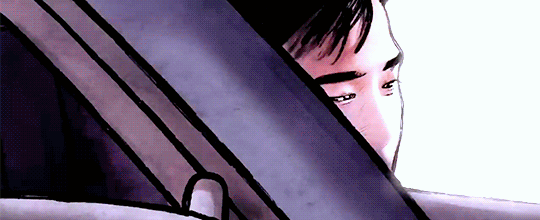
Han Hyo-Joo as Oh Yeon-Joo. Despite the fact that Yeon-Joo’s character becomes less proactive in the second half of the series (as I will discuss below), she was the one who really carried the show for me, certainly on the emotional side of the spectrum, where Kang Chul felt a little flat throughout (to be fair, he’s more the analytical type and he’s a manhwa character). She was also able to convey humour quite well, especially in the earlier, funnier, episodes.
The execution (of the first half). The first episode doesn’t waste a second setting up the story and there is never a dull moment. Watching Yeon-Joo read the latest episode of the manhwa and witness her reaction as she sees herself in the comic was gripping and I was eager to see what the next episode would bring. The show was also fairly consistent with the rules of travelling back and forth and what one could and couldn’t do in the cartoon world. We were witnessing an epic struggle between the cartoonist who wanted to kill his creation with his stylus and the daughter who wanted to protect him so much that she had willed herself into his world (if that’s not a good setup for a love story, I don’t know what is). And all the while, Kang Chul was putting the pieces of the puzzle together in his universal and unrelenting search for truth. Every episode brought something new to the table and, much like the manhwa, ended with some revelation or cliffhanger that kept you on the edge of your seat asking for more. Unfortunately, I think that was also its downfall.
What I didn’t like:
The execution (of the second half) and the overall pacing. I think the (relative) downfall of this series was trying to do too much too early. It worked for the first half because the show had a lot of material it could burn through and, in a way, it was refreshing that it was willing to do so. Sadly, my thoughts eventually turned from, “What’s going to happen next?” to “What can even happen next?” The story was moving so fast that I began to wonder where exactly it was going, and that’s when some of the flaws started to seep through. Episode 9 focused on the aftermath of Yeon-Joo resetting events, thus making Kang Chul forget all about her. While I certainly felt for her when she met her amnesiac husband, this was largely thanks to Han Hyo-Joo’s performance (and good track selection), for Kang Chul had been her husband in name only. Had we previously seen more episodes of their life together, this scene would’ve been a lot more impactful, and her desperate crying outside the operating room more heartfelt. Then, the plot thickens as we move into the (overly) dramatic second half of the show, with the introduction of a villain who knows about the real world and starts manipulating events in the manhwa for his benefit... by possessing cartoonist Oh Seong-Moo! What? This was never established as even remotely possible! (not to mention it doesn’t make sense) As you can imagine, this is whereabouts the rules of this universe start to break down and anything goes. Furthermore, when this villain is defeated in Episode 13, the show suddenly remembered it already had an antagonist perfectly cast for the part and finally decided to put him to use, although too little too late for my taste. As if that weren’t enough, a character is killed because drama, since any other explanation would make no fucking sense. This death is entirely nonsensical and I was beginning to conclude the show should have ended a lot sooner.
The amount of flashbacks/dreams/recaps/plans. I don’t mind a good recap or a flashback every now and then, but there came a point where the show started abusing this narrative device a little too much. The show spent a lot of time either: going over things we already know; featuring lengthy dream sequences that are very transparent and serve no purpose (although, incidentally, would make for a better ending); or laying out how events are supposed to go only for them to go in a completely different direction. While they are sometimes necessary, most of the time they were just padding that actually detracted from the story.
How secondary the supporting characters in the manhwa truly are. I know Kang Chul is supposed to be the protagonist but his bodyguard and secretary aren’t given a whole lot to work with throughout the show. I wish they had been active participants in learning the truth of their world rather than passive bystanders.
How Yeon-Joo becomes less proactive in the second half. Maybe it’s just a feeling, but I think our female protagonist became more reactive and less proactive in the second half, with Kang Chul being the one who mostly directed the course of events. It didn’t help that she kept fainting every now and then, what meant she had to spend some time in bed, what was a shame since she was the more interesting character. To be honest, I think the whole father arc should’ve been over and done with in the first half, with Yeon-Joo stepping up to be the new cartoonist.
OTP: Undercooked, but Han Hyo-Joo manages to almost convince me.
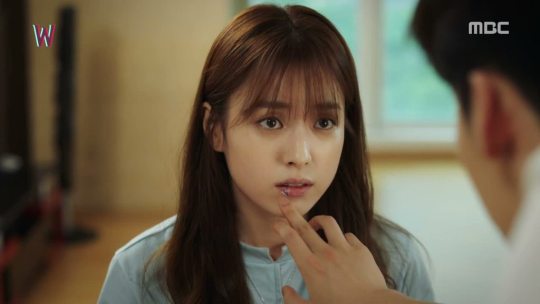
Verdict: It’s hard not to say W is one of the most refreshing shows I’ve seen in a while, even despite its more prominent flaws in the second half. I don’t like how powerful the drawing tablet became, especially after it was established that the manhwa could, at times, overrule the will of the real world, as clearly depicted when Kang Chul refuses to commit suicide. I’d rather the manhwa characters had resolved things on their own, aided by Yeon-Joo, without having to resort to some ultra-powerful plot device. Furthermore, I think the show should’ve taken things a bit more slowly rather than try to surprise us every episode, and use that time to build the relationship between Yeon-Joo and Kang Chul. Another thing I feel the show didn’t exploit to its fullest was the fact that Yeon-Joo knows just about everything that’s transpired in W’s world, what maybe could’ve aided Kang Chul in his investigation (sadly, this is undermined by the fact that the murderer really has no identity, what I find odd). Last but not least, Kang Chul never remembering his “past life” was a missed opportunity.
Rewatch meter: Medium
My Strange Hero (2018)
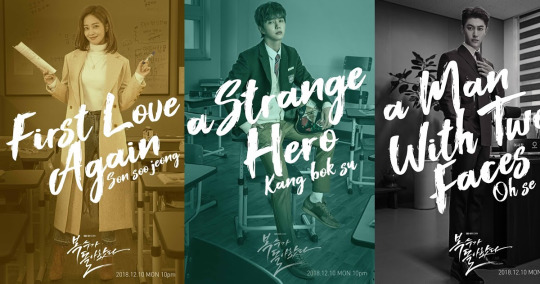
From left to right: Jo Bo-Ah as Son Soo-Jung; Yoo Seung-Ho as Kang Bok-Soo; and Kwak Dong-Yeon as Oh Se-Ho.
Release Date: December 10, 2018 - February 4, 2019
Episodes: 32
Available on: Viki
Summary: When Kang Bok-Soo was a high school student, he was falsely accused of committing acts of violence and ended up expelled from school. Those who brought the accusations against him were his first love, Son Soo-Jung, and a fellow student, Oh Se-Ho. Nine years later, Bok-Soo saves Soo-Jung’s life and suddenly finds himself a mediatic sensation. In order to improve the school’s somewhat tarnished image, he’s invited back to finish his studies. Bok-Soo hesitates, but when he learns Soo-Jung is a teacher there and Se-Ho is the new director, a latent desire to get revenge surfaces. Will Bok-Soo finally get his revenge on the people who wronged him nine years ago? Or will he spend most of his time doing anything but? The latter.
What I liked:
Teacher Park. He’s the kind of teacher everyone would like to have in high school and an example of moral rectitude that Soo-Jung tries to follow. You can tell he really cares for all the students and always tries to be fair and just, no matter the personal cost.
Soo-Jung’s arc. Probably the character who experiences the most growth throughout the show, in no small part thanks to her starting point. She’s the only teacher who stands up for her students, is willing to expose the corruption in the school, and goes so far as to quit her job because she feels she didn’t earn her spot fair and square (despite Oh Se-Ho telling her she was hired because of her qualifications). It is worth noting that when Mr Park gives the other teachers the chance to own up and resign honourably nobody does.
What I didn’t like:
The series meanders a lot early on. Initially, I watched till Episode 14 and dropped it because nothing was really going on. Bok-Soo says he wants to get revenge but his heart really isn’t into it. He certainly doesn’t have a plan like, say, Edmond Dantes in The Count of Monte Cristo, or Emily Thorne in Revenge. In fact, for those first 14 episodes, it only seemed he went there to suffer some more at the hands of the same people who wronged him all those years ago. What leads me to...
Son Soo-Jung isn’t a very likable protagonist initially. I don’t know if this is done on purpose to get us to side with Bok-Soo, but it doesn’t seem like a very smart strategy to have us dislike the lead’s main love interest for almost half the length of the series. I mean, that’s what the antagonist is for. It seems like at every opportunity she twists the knife on Bok-Soo’s back a little more, so much so that a hurt Bok-Soo outright demands, “Why don’t you just ask me what happened instead of constantly making assumptions?” (I’m paraphrasing) Her response, basically telling him to fuck off, didn’t win her any points in my book. That’s about when the writers probably realized their mistake and started filling us in on how Soo-Jung’s life was also miserable after Bok-Soo was expelled so please don’t hate her. They also pull a 180 when she stands up for Bok-Soo during a disciplinary hearing, what I thought was quite out of character for her at the time. The two seem to patch up their relationship awfully fast, what struck me as odd as they didn’t seem to have much chemistry. Having said that, Soo-Jung’s character certainly grows after Episode 14 and has a very satisfying arc, ultimately being the only teacher worth a damn in this school, other than Mr Park.
“Is Kang Bok-Soo’s revenge finally starting?” After I initially dropped this show at the Episode 14 mark, a video popped up in my YT feed with that title (only they used the actor’s name instead of the character’s). It was a scene where Bok-Soo went about exposing the many deeds of corruption within the school. Great, I thought, shit is finally hitting the fan... in Episode 26. I resumed watching from that mark until the end. The series had finally managed to get me invested, almost as it was over, and I decided to watch the episodes I’d missed.
OTP: There are some cute moments but I still didn’t feel the chemistry (what, ultimately, is my entirely subjective take).
Verdict: I don’t feel this is a true romance drama like others on this list, if ever it tried to be, what’s decidedly strange because there are many episodes dedicated to exploring the relationship between Bok-Soo and Soo-Jung with little else going on. Instead, I see it as more of a critique on the Korean education system and the immense pressures students are subjected to in order to meet unreasonable standards, with some romance elements sprinkled on it so that it’s not too depressing. That’s my take on it anyway. As such, it has some enjoyable aspects to it, like seeing Bok-Soo share nuggets of wisdom every now and then, or the students standing up for Bok-Soo and their school, or the revenge/investigation finally kicking into high gear. It’s just unfortunate it took so long to get there and didn’t really encourage me to do so.
Rewatch meter: Low
The Secret Life of my Secretary (2019)

From left to right: Koo Ja-Sung as Ki Dae-Joo; Kim Young-Kwang as Do Min-Ik; Jin Ki-Joo as Jung Gal-Hee; and Kim Jae-Kyung as Veronica Park/Park Ok-Sun.
Release Date: May 6 - June 25, 2019
Episodes: 32
Available on: Viki
Summary: The story follows Do Min-Ik, a prominent director at T&T Mobile Media, and his secretary, Jung Gal-Hee, as together they deal with the onset of an illness that prevents Do Min-Ik from seeing faces, the result of a possible attempt on Min-Ik’s life by some unknown party. On the corporate drama side, this undermines his shot to succeed his (jerk of an) uncle as Chairman of the company, and we see Min-Ik and Gal-Hee struggling to hide the truth of his illness and overcome the many obstacles set on their way to chairmanship. On the romance side, his inability to recognize faces causes him to mistake his secretary for Veronica Park, a rich heiress and leading figure in the film industry, whom he eventually falls in love with... what is kind of a problem since the real Veronica Park develops a crush on Min-Ik’s best friend, Ki Dae-Joo (also a director at T&T), while Gal-Hee falls in love with her boss. And, just in case we didn’t have enough corporate drama, we learn early on that someone may be embezzling from T&T and all the signs point to Dae-Joo. How will this all turn out?
What I liked:
Do Min-Ik and Jung Gal-Hee working together. Min-Ik is one sharp boss, and the moment he’s unable to recognize faces, he starts devising other strategies to recognize people, such as identifying them by their height. Gal-Hee pitches in with the different directors’ hairstyles, and eventually Min-Ik is even able to recognize them by their specific tics. Another example is the first stockholders’ meeting where they team up to prevent Min-Ik’s dismissal. Everything goes so smoothly that it prompts Veronica Park to ask Gal-Hee, and I’m paraphrasing here, “Did you write the script to this play?”
What I didn’t like:
The deceit lasting so long. Min-Ik doesn’t start as the best of bosses, we see that in the first episode, but that very same episode opens the door for him caring for Gal-Hee more than he’s willing to let on. The show does a good enough job of explaining his rather rude behaviour towards his secretaries and why he always fires them within a year, what makes the deceit all the more hurtful. However, the problem I have with Min-Ik not realizing Gal-Hee was pretending to be Veronica Park, is that this happens for 24 episodes! That means we only have 8 episodes left for him to feel betrayed about the whole thing yet also recover in time to start dating Gal-Hee. I don’t feel this was enough time to successfully explore their relationship.
How weak/bland every other story is. The attempt on Min-Ik’s life and the police’s investigation of it is handled abysmally, with the detectives only appearing from time to time to create what some writer thinks is drama. They’re so useless that the perpetrator actually has to turn himself in! I thought Dae-Joo was a bland character throughout, so I had zero interest in his relationship with Veronica Park. The same goes for Gal-Hee’s family. Even Min-Ik’s mother somehow pulls a 180 out of the blue. The only other plot thread that caught my eye was the possible embezzlement and that was wrapped up horribly, what leads me to...
No one facing the consequences of their actions. No matter how much the writers want to frame this secret organisation within T&T as Robin-Hood-like, the fact remains that they were stealing. Not only that, but they can be directly tied to the assault and attempted murder of Do Min-Ik, among other crimes. Sure, they’re all fired at some point, but they all get hired back thanks to Min-Ik. Nobody faces any jail time except for the guy directly responsible for Min-Ik’s accident who actually apologizes to him and turns himself in. The leader of this shadowy organisation comes out unscathed and has her machinations to see Dae-Joo become chairman of T&T rewarded when...
Dae-Joo becoming the chairman of T&T. What a payoff. The blandest and most uninterested character in the entire show becomes the chairman when the character we’ve been rooting for throughout, the only one who’s willing to put everything on the line to help the downtrodden secretaries, gets the short end of the stick. I guess it’s true when they say no good deed goes unpunished.
OTP: There is some chemistry there and I wish we had seen more of it, but sadly the (official) relationship between Gal-Hee and Min-Ik takes place a little too late.
Verdict: Usually, most of the kdramas I’ve watched and liked, to some extent, have some scenes that are imprinted on your mind (much like Gal-Hee’s face is imprinted on Min-Ik) and that you find yourself returning to from time to time. With this show, I honestly had to struggle to recall any such scenes, even with the aid of YouTube playlists. This is not helped by the fact that I can recall none of the music used, and that’s not a good sign. Memorable scenes and songs usually go together, as the next show in my list will prove. Ultimately, The Secret Life of my Secretary, while entertaining enough, didn’t live up to my expectations and, as such, it’s unlikely I’ll be rewatching it any time soon.
Rewatch meter: Low
Angel’s Last Mission: Love (2019)

Shin Hye-Sun as Lee Yeon-Seo, and Kim Myung-Soo (Infinite L) as Kim Dan.
Release Date: May 22 - July 11, 2019
Episodes: 32
Available on: Viki
Summary: Kim Dan, a troublemaking angel with a kind heart, is 24 hours away from Heaven when he meets the beautiful, talented, yet cynical and arrogant, prima ballerina Lee Yeon-Seo. Recently blinded by an accident during a performance, Yeon-Seo somehow manages to spot Kim Dan, who should be invisible to any human. His curiosity sparked, he follows Yeon-Seo around and eventually, in a fit of impulsiveness, saves her life in a car accident. However, for having interfered and saved a human’s life, Kim Dan is fated to turn to dust... unless he’s willing to undertake one final task. His mission? He must help Yeon-Seo find true love, but will he be able to keep from falling in love himself? Obviously not. And, naturally, Yeon-Seo has some evil relatives who are out to get her, because it wouldn’t be a kdrama otherwise.
What I liked:
The songs. I can’t vouch for the entire OST for I haven’t listened to it all yet (Correction: I’ve now since listened to all of it and it really has a lot of good tracks), but there are at least a handful of songs that will stick with you like glue. I can’t say if I like the songs more because of the scenes in which they play, or if I like the scenes more because of the songs that are used, but I can say the songs play an important role in engraving these scenes into my mind. Songs like ‘Sweeter’, by Jess Penner, that play when we’re playfully exploring the relationship between Yeon-Seo and Kim Dan; or ‘Pray’, by KLANG, when some important relevation or dramatic scene is about to transpire; or ‘Oh My Angel’, by Chai, that plays during the more romantic moments; these songs have made it into my Spotify list and are a must-listen on a daily basis for now.
The humor. Beyond the interactions between Kim Dan and Yeon-Seo, which sometimes make for very humorous situations, my hat’s off to the characters of Archangel Hoo, Dan’s senior (played by Kim In-Kwon) and Chung Yu-Mi, Yeon-Seo’s butler (played by Woo Hee-Jin). The former has dozens of opportunities for humor as he’s able to take the form of any human and keeps surprising Kim Dan by keeping tabs on him. The latter is probably the closest thing Yeon-Seo has to a mother (or maybe an older sister), and can be playfully mischievous when she starts noticing our leads may have feelings for each other. There are two scenes that perfectly embody the show’s humor that I would be remiss if I didn’t direct you to. Be aware they contain spoilers.
youtube
youtube
The leads and their chemistry. You cannot make a kdrama work if the leads don’t have some sort of chemistry (well, I suppose you could but it would be a bit of an uphill battle) and Shin Hye-Sun and Kim Myung-Soo have that in spades. This shows not only during the more romantic scenes, what’s expected, but also during their fights, what’s even better (if that makes any sense). This isn’t the first time I’ve seen L acting, in fact, he played the character of Yoo Tan in the short kdrama One More Time, with actress Yoon So-Hee playing his love interest, Moon Da-In. He sold me on that show then, as did Yoon So-Hee, but I feel his acting’s improved in this, or maybe the script and length of the show allows him to flesh out his character more, showing us more sides of his personality as the show draws to its end. And it’s really amazing to see how effortlessly Shin Hye-Sun can don the skin of the strong, cold, and harsh Yeon-Seo in one scene, and then swap it for the playful, romantic, and vulnerable Yeon-Seo that Kim Dan falls in love with in the next. Just watch more of those KBS World TV clips if you don’t believe me. These two steal every scene they’re in, but I feel Shin Hye-Sun is really the standout here. (At the time of this posting, Shin Hye-Sun has won the Top Excellence Award (Female) in KBS’s 2019 Drama Awards for her role in this show, so congratulations to her on an award well deserved!)
What I didn’t like:
How the show meanders towards the end. I laid out the plot in the most succinct way possible, but it’s hardly that straightforward. Dan’s mission should, in theory, be over when Yeon-Seo learns to love again, but then the show would then be over a lot sooner than Episode 32. The writers know that so they move the goalpost, at some point revealing that Dan also had to learn to love for the mission to be truly over. Not only that, but they both had to be willing to sacrifice everything for their loved one in order for God to believe their love was sincere or something, what leads one to think they need to commit suicide and the other to think they need to commit murder. I don’t know, by this point the show’s either stretching things out to reach the 32-episode mark or they’re milking each scene for every ounce of drama they can get, probably both. This problem gets compounded by the fact that...
Some (other) things don’t make a whole lot of sense. To start with, the theology and consistency on this show is all over the place. The same God that apparently ordered a couple of angels to shoot someone, gangsta style, because an angel broke the rules and fell in love with a human, is moved by our lead couple’s Romeo-and-Juliet love story and by Yeon-Seo’s ballet performance. Oh, and by the way, shooting someone is not how unruly angels are dealt with, God can simply pull a Thanos and have them vanish into mist, so why did he decide to use a gun that one time? Because drama! God also decides that the best time to send Dan to Heaven is when Yeon-Seo is lying commatose in the hospital (what a dick), to which Dan says, “Fuck it, I’m staying here,” and God lets him return as an angel so he can help Yeon-Seo wake up, interfering once again and thereby ceasing to exist... except he’s still an angel an episode later! What the f*** is going on here?! Archangel Hoo broke the rules once and he got the Thanos treatment, so how come Kim Dan gets so many second chances?
Some characters are either superfluous or their arcs are unclear. As an example of the latter, there’s the character of Ji Kang-Woo (played by Lee Dong-Gun), Yeon-Seo’s ballet instructor and Kim Dan’s rival for Yeon Seo’s affection. It’s revealed early on that he’s an angel-turned-human after breaking the rules and falling in love with a human himself... whom the gangster angels promptly killed. It’s never explained why she had to die while Yeon-Seo and Kim Dan are allowed to stay together, but apparently Kang-Woo is satisfied that his pain was necessary so he could help them trick God or something. I’ve no idea. But the award for the most superfluous character has to go to Ni-Na’s secret ballet instructor who only appears when the script dictates and is not developed at all. I can’t even remember if she had a name! What was her point even?
OTP: Probably one of the best pairings of the year (says the guy who’s watched maybe 4-5 2019 shows out of who knows how many).

Verdict: This is a case of the pros outweighing the cons. There’s simply too much that works for me, so many scenes and songs that stayed with me thanks to the strong performances of our leads and some of the supporting cast. I was never unaware of its more glaring flaws, what prevents this show from reaching Goblin levels of quality, but I could easily find myself rewatching it from time to time.
Rewatch meter: High
Strong Woman Do Bong-Soon (2017)
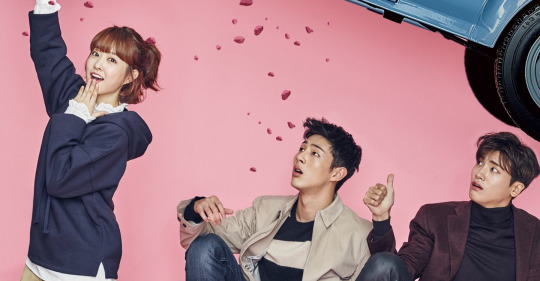
From left to right: Park Bo-Young as Do Bong-Soon; Ji Soo as In Guk-Doo; and Park Hyung-Sik as Ahn Min-Hyuk.
Release Date: February 24 - April 15, 2017
Episodes: 16
Available on: Viki, Netflix
Summary: Do Bong-Soon has a secret: she is insanely strong, a superhuman ability that has been passed down to the women in her family for generations. She also aspires to create a video game with herself as the main character. When Ahn Min-Hyuk, the CEO of gaming company Ainsoft, chances by her as she’s beating up half a dozen thugs, he’s instantly mesmerized by both her beauty and strength. The recent target of anonymous threats, Min-Hyuk decides to hire Bong-Soon as a bodyguard (she ends up being more of a secretary) and she accepts with the promise of joining the planning department of Ainsoft once the culprit is caught. Meanwhile, detective In Guk-Doo, Bong-Soon’s secret crush and childhood friend, investigates a series of strange kidnappings and murders in Bong-Soon’s neighbourhood. When the culprit targets Bong-Soon’s best friend, Bong-Soon and Min-Hyuk find themselves involved in the hunt for the criminal.
What I liked:
Gangster Bong-Soon. Okay, maybe saying she’s a gangster is a bit too much, but after beating a bunch of school bullies into submission, they soon look up to her as their new boss, taking orders from her and even looking out for her so that her secret isn’t exposed. It’s pretty funny then that Bong-Soon has to save her crew from being harassed by the new neighbourhood bullies, acting the part of a gangster for a short while.
The need for training. I appreciate the fact that Min-Hyuk foresaw the need to help Bong-Soon have full control of her strength, although he also created routines to bolster up her endurance, not to mention some of the moves she learned could have come in handy when she was depowered (sadly, she doesn’t use them). And all of this training does indeed pay off, as we see Bong-Soon fight smartly and using only as much strength as is needed to get the job done, as opposed to her Episode 1 self who used way too much strength with hilarious results. You can witness the results of Min-Hyuk’s training in the fight with the “new bullies” I mentioned previously, as well as the one at the beginning of Episode 9. Beyond fighting, her training also had positive results in her everyday life, like now being able to hug people without worrying about choking them.
youtube
The leads and their chemistry. The chemistry of these two is off the charts (it’s over 9000!!!). Everything about Park Bo-Young as Do Bong-Soon screams cute, from her short height to the way she talks, and even her glares of disapproval when Min-Hyuk does something he shouldn’t have. She’s also confident when she needs to, but not afraid to show vulnerability around the people she loves. I could shower similar praise on Park Hyung-Sik as Ahn Min-Hyuk, especially where the vulnerability department is concerned. Male leads tend to be more stoic (like In Guk-Doo), so it was quite refreshing to see how devastated Min-Hyuk was when he learned the identity of the one threatening him, or how crazy-in-love he is around Bong-Soon (she’s his kryptonite). Min-Hyuk is never afraid to wear his heart on his sleeve and it shows in every single scene. These two can just stare at each other in silence and convey more emotion than any spoken word.
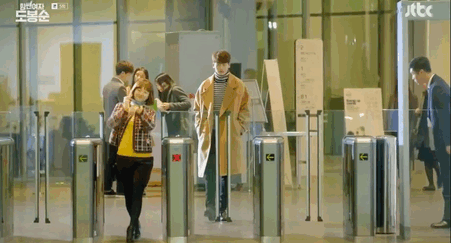
The humor. I’m not talking about the dumb hospital scenes that feature humor more similar to what you’d find in a crappy Hollywood “comedy” (peeing jokes, really?), but things like Hyung-Sik’s ad-libbing throughout the show (he’s having a blast), or the more funny interactions between Min-Hyuk and Bong-Soon, even the ever-changing Romeo and Juliet scenes as Bong-Soon’s feelings for the different characters evolve.
What I didn’t like:
The sudden disappearance of Min-Hyuk’s family. Initially, the show has two distinct storylines: the string of kidnappings/murders, on the one hand; and the threats to Min-Hyuk, likely related to the question of who in his family will become the new Chairman of Ohsung Group. As expected, Min-Hyuk has several brothers who are a bit jealous of his success with Ainsoft and intuit their father will name him the Chairman, so it makes sense one of them is behind the threats. Once the storyline is resolved however, Min-Hyuk’s family is completely out of the picture, even during his marriage, what I find extremely odd.
The randomness of the depowering rule. Very early on the show explains that, while the women of the Bong-Soon family are blessed with superhuman strength from birth, they can easily lose this ability should they try to use it for less than honorable pursuits. It can be something as simple, and apparently harmless, as using this strength to become an Olympic weightlifting champion, as Bong-Soon’s mother soon found out, but it’s usually tied to using this ability to hurt innocent people. Naturally, once this rule was made known, it was only a matter of time before Bong-Soon would lose her powers as well, and this did indeed happen towards the end of the show. The problem I have with it is two-fold: its execution and its consistency. Bong-Soon doesn’t purposefully hurt an innocent man, she’s tricked into doing so by the villain. One could argue that whatever higher power granted this ability can’t tell the difference, except that argument falls apart entirely when you realize Bong-Soon has already purposefully used her power to hurt innocent people, like that one time she crushed Min-Hyuk’s foot to keep him silent (among multiple examples). That this event is played for laughs should have no bearing on the outcome. Furthermore, we later see Bong-Soon pleading for her strength to return so she can save Min-Hyuk, so it would appear that whatever higher power was listening is intelligent. At the end of the day, we all know this happened because the writers didn’t want to limit the fun possibilities of Bong-Soon abusing her power a little bit, saving it for the right moment to amp the drama. So, in reality, I was aware of it, and decided to roll with it.
OTP: Cuteness overload.
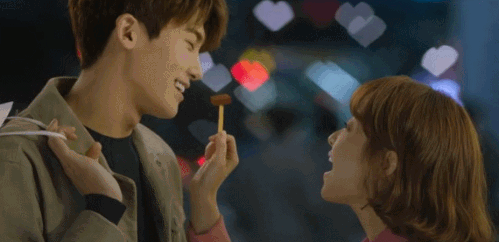
Verdict: This is one of the strongest shows in this list (no pun intended), more so given how much it’s able to pull off in 16 episodes as opposed to other shows’ 32, which is why I’m more lenient in terms of its writing. This is simply a good, fun, show, easily rewatchable thanks to the cute OTP. While its soundtrack may not be on par overall with the one from Angel’s Last Mission: Love, it still features some solid, memorable, songs (’Heartbeat’ by SURAN being the most obvious, but also ‘Double Trouble Couple’ by MAMAMOO, or ‘Super Power Girl’ by Every Single Day), not to mention a highly effective and comedic use of sound effects. Definitely one of my favourite shows.
Rewatch meter: High
And that brings us to the end of Part 1. I hope you had a good time reading through this post, maybe even found a show to your liking. What were some of your favourite shows in 2019? Stay tuned for Part 2!
#kdrama#while you were sleeping#kdrama w#my strange hero#the secret life of my secretary#angel's last mission: love#angel's last mission#strong woman do bong soon#strong girl bong soon#netflix#viki#kdramas
15 notes
·
View notes
Link

Chapters: 5/? Fandom: 방탄소년단 | Bangtan Boys | BTS Rating: Mature Warnings: Creator Chose Not To Use Archive Warnings Relationships: Kim Namjoon | RM/Original Female Character(s), Park Jimin (BTS)/Original Female Character(s), Park Jimin (BTS)/Reader, Kim Namjoon | RM/Reader, Kim Namjoon | RM & Reader, Park Jimin (BTS) & Reader Characters: Kim Namjoon | RM, Park Jimin (BTS), Min Yoongi | Suga, Jung Hoseok | J-Hope, Kim Taehyung | V, Jeon Jungkook, Kim Seokjin | Jin, Reader, Original Female Character(s) Additional Tags: Smut, Fluff and Angst, Sad with a Happy Ending, Angst and Tragedy, Love, Love Confessions, Falling In Love, Romance, Alternate Universe - College/University, Established Relationship, Alternate Universe, Fluff
Summary:
You had everything you thought you could ever want or need. You loved every moment of your life, your career, family, friends and most of all the light of your life your husband, Namjoon.
Until a reckless mistake sealed your fate.
Going through the motions of loss; the riptide of grief takes you and is pulling at your seams. Can you move forward and find happiness once again?

“I love you Ava, you are my world, you make up all of the brightest stars in my constellation.”
first of all, I don’t think I have read anything with this pairing a Namjoon x OC/Reader x Jimin story so I was delighted as soon as I saw the relationships info on ao3, the only confusing thing for me was immersing into a named reader (y’all know I’m all for immersion) because it’s always strictly second person pov/y/n or third person pov/named oc that I’m used to but after a while, I got used to it and enjoyed reading the story.
[SPOILERS AHEAD - very minimal since this is an on-going story.]
this is a very interesting story, I thought it would be easy to predict what happens next but I’m actually having a hard time thinking of all the possibilities since this is an on-going story, starting off with Namjoon and Ava talking about constellations, a secret the adorable husband can’t keep, the things they’d do once they get to Australia, the veil of love and lust consuming them because they were so happy sigh honestly I heard my heart shattered when Joon said the name Ava because I thought he was cheating but turns out it was a named reader, I had to pause and re-read over and over because again this was something new to me after accepting and immersing into the story with a different name it actually had my heart fluttering once again recalling their unspoken words, their conversation in the car, the way they show their love through actions and words were beautiful until everything came crashing down, that’s when I finally realized that this will indeed be tragic as stated on the tags.
the flashbacks are very important in establishing how the couple met and how they were as lovers before getting married, this is also where we finally meet every other character that adds life to the story from Min who is very charming and knows what she wants, ugh I utterly adore her cute story with Taehyung, it really is true that when two people are meant to be together they’ll find a way back to each other, Taehyung (or Min’s boyfriend) is taking up media studies with Jungkook, Seokjin, of course, the handsome chaebol who has everything one could wish for, Yoongi and Hoseok, or the lovers who have different personalities but still bring out the best in each other and Jimin the professional dancer who made Ava realize her that she still has passion for dancing. honestly, I’m still clueless on how Jimin will enter the picture will he remain as a friend with unrequited feelings (we still haven’t established tho how he truly feels for Ava), will something blossom between him and Ava while they spend more time with each other, will he enter the picture during the present day where she will need her friends to support her now that Namjoon is most probably in critical condition (not to mention we still don’t know whether or not she is pregnant), I like that there are so many possibilities and with the transition from present to past to present makes me lose my mind in a good way because it makes the story worth investing time in.
I am looking forward to the future chapters of this story, I love how my heart has been played with way too many times from the named reader to the tragic accident, the flashbacks etc., the characterization is lovely and I wanna get to know them more, the details of the story, it’s one of the things I like about your writing (A++ to the smutty parts of the story because ngl I live for dom!Namjoon, well-written *standing ovation with flying kisses*) the air of mystery in every chapter because I wanna know what happened to them but I’m scared like what if Namjoon ends up in a coma or what if he suffers from amnesia? what if Ava is really pregnant? what if she gets devastated from whatever condition Namjoon is in and her vulnerability gets used against her but I doubt that scratching that idea rn~ but that’s just me and my imagination trying to appease my restless self while I wait for the next chapters.
anyways, thank you @kathkeatz-blog for sharing your story with us, these are my thoughts as a reader, I hope more people get to read your Then There Was You so they’d understand my excitement for the future of this story! | 🍒🍒🍒🍒🍒
#a:kathkeatz#t:then there was you#m:knj#m:pjm#ft:ksj#ft:myg#ft:jhs#ft:kth#ft:jjk#g:angst#g:fluff#g:romance#g:smut#au:university#au:lovers#au:married#series#ao3#🍒🍒🍒🍒🍒#k:fingering#k:choking#k:ds#I made sure to not spoil a lot ~ this is an ongoing story so come and read with me#if you want to be tangled up in something romantic with joon and jimin then I suggest you read this story <3#kath your way with words are so beautiful#whenever ava sees joon ugh my heart flutters but she's spicy when she sees jimin :3
9 notes
·
View notes
Text
For @quoderospero: You asked for this
Under the cut is my full list of Taylor Swift lyrics that hurt me and make me think of Merthur mostly, but also other characters. Enjoy and feel pain with me!
Also tagging @violetchachkii in case you get bored and ever want to hurt me with gifsets :)
Don’t Blame Me:
“For you, I would fall from grace, just to touch your face”
Breathe: Honestly, this whole song is just Merlin directly after 5x13
“Now I don’t know what to be without you around”
“I can’t breathe without you, but I have to”
“Never wanted this, never want to see you hurt. Every little bump in the road I tried to swerve.”
“Nothing we say is gonna save us from the fallout”
King of My Heart:
“And all at once you are the one I have been waiting for, king of my heart, body and soul”
Last Kiss: a lot of this doesn’t fit lyrically, but the general feeling is very post 5x13
“Never imagine we’d end like this. Your name, forever the name on my lips”
“The life of the party, you’re showing off again, and I roll my eyes, and you pull me in”
The Story of Us:
“So many things that I wish you knew. So many walls up I can’t break through”
“I used to know my place was the spot next to you”
If This Was A Movie:
“Six months gone and I’m still reaching, even though I know you’re not there”
“Come back, come back, come back to me like you would, you would, if this was a movie”
“If you’re out there, if you’re somewhere, if you’re moving on. I”ll be waiting for you, wary since you’ve been gone”
“But if this was a movie you’d be here by now”
The Other Side of the Door:
“I said leave, but all I really want is you”
“And don’t you leave, cause I know all I need is on the other side of the door”
“I can’t even look at you, I don’t need you but I do, I do, I do”
Mine:
“You are the best thing that’s ever been mine”
Treacherous:
“Put your lips close to mine, as long as they don’t touch. Out of focus, eye to eye, til the gravity’s too much. And I’ll do anything you say, if you say it with your hands. And I’d be smart to walk away, but you’re quicksand.”
“I can’t decide if it’s a choice, getting swept away. I hear the sound of my own voice, asking you to stay. And all we are is skin and bone, trained to get along. Forever going with the flow, but you’re friction.”
This Love: Actually, fuck this song because it’s gonna make me cry. Literally post 5x13 until Arthur comes back
“Clear blue water, high tide, came and brought you in...current swept you out again, and you were just gone and gone, gone and gone.”
“In silent screams, in wildest dreams, I never dreamed of this.”
“Your smile, my ghost, I fell to my knees”
“These hands had to let it go free and this love came back to me”
Stay Beautiful:
“If you and I are a story that never gets told, if what you are is a daydream I never get to hold, at least you’ll know.”
You Belong With Me:
“Been here all along so why can’t you see you belong with me?”
Sad, Beautiful, Tragic:
“Words, how little they mean, when you’re a little too late”
“In dreams I meet you in warm conversation. And time is taking its sweet time erasing you”
FIfteen: This is Merlin arriving in Camelot
“Count to ten, take it in, this is life before you know who you’re gonna be”
Superman: This song is more Arthur as a character and Arthur/Gwen as a ship
“He’s got his mother’s eyes, his father’s ambition”
State of Grace:
“And I never saw you coming. And I’ll never be the same”
“These are the hands of fate, you’re my Achilles heel, this is the golden age of something good and right and real”
New Year’s Day:
“Don’t read the last page, but I stay when you’re lost and I’m scared and you’re turning away”
“Hold on to the memories they will hold on to you”
Delicate:
“I pretend you’re mine all the damn time”
Superstar:
“I’m no one special just another wide eyed [boy] who’s desperately in love with you”
“You smile that beautiful smile and all the girls in the front row scream your name”
I Did Something Bad: This whole song is Morgana but here’s the highlight
“If a man talks shit than I owe him nothing. I don’t regret it one bit cause he had it coming.”
I’m Only Me When I’m With You: Once again, basically the whole song
“And sometimes we don’t say a thing, just listen to the crickets sing. Everything I need is right here by my side.”
“And I know everything about you, I don’t wanna live without you”
“Well you drive me crazy half the time, the other half I’m only trying to let you know what is and isn’t true. And I’m only me when I’m with you.”
“When I’m with anybody else, it’s so hard to be myself and only you can tell”
Everything Has Changed:
“Cause all I know is we said hello, and your eyes look like coming home. All I know is a simple thing, everything has changed.”
“Come back and tell me why I’m feeling like I missed you all this time”
“You’ll be mine and I’ll be yours all I know since yesterday is everything has changed”
A Place in This World: Again, Merlin in Episode 1
“I don’t know what I want, so don’t ask me, cause I’m still trying to figure it out. Don’t know what’s down this road, I’m just walking”
Look What You Made Me Do: Whole song is Morgana
“The role you made me play of the fool, no I don’t like you.”
“But I got smarter, I got harder in the nick of time.”
“Maybe I got mine, but you’ll all get yours.”
Come Back, Be Here:
“And this is when the feeling sinks in, I don’t want to miss you like this. Come back, be here.”
“If I had known what I know now, I never would have played so nonchalant”
“This is falling in love in the cruelest way. This is falling for you when you are worlds away”
“I can’t help but wish you took me with you”
Change:
“But I believe in whatever you do, and I’ll do anything to see it through.”
“It was the night things changed, can you feel it now? The walls that they put up to hold us back fell down”
Holy Ground:
“And right there where we stood was holy ground”
“And sometimes I wonder how you’d think about it now, and I see your face in every crowd”
I Know Places:
“And I know for you, it’s always me”
“And I know for me, it’s always you”
Haunted:
“Come on, come on, don’t leave me like this...something’s gone terribly wrong you’re all I wanted”
Call it What you Want:
“Bridges burn, I never learn, at least I did one thing right”
Gorgeous:
“You should think about the consequence of your magnetic field being a little too strong”
“You should take it as a compliment that I got drunk and made fun of the way you talk”
Long Live: Strap in folks, this is another one that almost made me cry
“It was the end of a decade, but the start of an age.”
“All the kingdom lights shined just for me and you”
“I was screaming long live all the magic we made”
“One day we will be remembered”
“Long live all the mountains we moved, I had the time of my life fighting dragons with you”
“Can you take a moment-promise me this. That you’ll stand by me forever, but if God forbid fate should step in. And force us into a goodbye-if you have children someday-when they point to the pictures, please tell them my name?”
Innocent:
“Who you are is not what you did”
“You wouldn’t be shattered on the floor now, if only had seen what you know now then”
Today Was a Fairytale
“You’ve got a smile that takes me to another planet”
“All that I can say is now it’s getting so much clearer. Nothing made sense till the time I saw your face.”
Dress:
“There is an indentation in the shape of you. Made your mark on me a golden tattoo”
“My hands are shaking from holding back from you”
“I don’t want you like a best friend”
“All of this silence and patience, pining and anticipation”
“Even in my worst times you could see the best of me”
Dancing With Our Hands Tied:
“I loved you in spite of deep fears that the world would divide us”
“Oh, cause it’s gravity keeping you with me”
“I’d kiss you as the lights went out, swaying as the room burned down”
Fearless:
“And I don’t know how it gets better than this, you take my hand and drag me headfirst, fearless”
Out of the Woods:
“We were built to fall apart, then fall back together”
Sparks Fly:
“I’m on my guard for the rest of the world but with you, I know it’s no good.”
Tied Together With a Smile: Arthur and Merlin at alternate points in the series
“And you cry, but you don’t tell anyone, that you might not be the golden one”
“I guess it’s true that love was all you wanted, cause you’re giving it away like it’s extra change.”
Cold As You:
“You put up walls and paint them all a shade of gray. And I stood there loving you and wished them all away.”
I Wish You Would
“I wish you knew that, I’d never forget you as long as I live.”
Come in With the Rain: Merlin post 5x13
“I’ll leave my window open cause I’m too tired at night to call your name. Just know I’m right here hoping that you’ll come in with the rain.”
White Horse: post 5x13
“I had so many dreams about you and me, happy endings, now I know.”
Ours: Honestly, the whole song
“If you were here we’d laugh about their vacant stares, but right now, my time is theirs.”
“People throw rocks at things that shine and life makes love look hard”
Red: Another one that hit me like a mack truck
“Loving him is like trying to change your mind once you’re already flying through the free fall”
“Losing him was blue like I’ve never known, missing him was dark gray all alone. Forgetting him was like trying to know somebody you never met. But loving him was red.”
“Remembering him comes in flashbacks and echoes, tell myself it’s time now, gotta let go, but moving on from him is impossible when I still see it all in my head, burning red.”
Stay, Stay, Stay: The tone of the song is very them
“All those times that you didn’t leave, it’s been occurring to me I’d like to hang out with you for my whole life.”
Enchanted:
“The playful conversation starts, counter all your quick remarks like passing notes in secrecy”
“All I can say is I was enchanted to meet you”
“Please don’t be in love with someone else, please don’t have somebody waiting on you”
--
If you made it through this, you deserve a prize but I hope you enjoyed!
11 notes
·
View notes
Text
The Homestuck Epilogue and Analysis of the Text as a Whole (brief)
EPILOGUE SPOILERS AHEAD
As many of you in this fandom have recently born witness to: The Epilogue is finally here. It begins with a prologue, with John being disillusioned from the world and Rose telling him that him going back is essential. In the beginning of the story we are introduced to the idea of things which, viewed from the lens of the greater story, are not necessarily measured in terms of one person’s moral stand point of “Good” or “Bad”, rather Essential and Inessential. This is the axis upon which Vriska turns, this is the path of events which Rose can see, and this is the stage upon which the conflict of our two Narrators comes to pass.
To understand the Epilogue, we must first, briefly, summarise some of the core themes of Homestuck. These, in short being: The Agency of the Characters, The Narrative itself as the Villian, and the meaning of Freedom.
We will begin with the meaning of Freedom. What it means to be Home Stuck. Homestuck is not named simply as a joke about the start of the story, but its name rings true as an abstract way of representing the main objective of its characters. To win, and be at peace in the new Universe. For you see, much like Problem Sleuth, they only leave the house at the very end. But this only makes sense if you understand the Symbols because as Rose Lalonde, Seer of Light, One who Understands the Narrative’s Focus, explains: “The symbols holdall the power”. As you are probably all aware, the entire story focuses on the fates of the characters as they toil through the Alpha Timeline. As we later learn, this “timeline” is not the one which leads to the most fortuitous outcome, nor is it one which allows all characters to have equal relevance or fulfillment. It is simply an extremely specific series of events which allows the main villian of the Text, Lord English, to exist, take pleasure in his wanton destruction, and then die and be reborn all in a circuitous loop. Sure, the kids “Stop” Lord English in the end, but their Victory is more defined by their escape from their terrible, dire, and tragic situation. They enter their “Roles” by way of Sburb, which is symbolised by a House. A human house, a troll house, it doesn’t matter. It ends with them escaping through the door never to be truly seen in the comic again. They finally leave The House, and by House I mean the Narrative, which for the purposes of this examination is essentially interchangeable with Lord English himself, because in truth that’s what he represents.
Lord English is the main villian of homestuck, but what he represents is a core theme of understanding the story. Lord English’s character design is essentially made to be a charicature of Andrew Hussie himself, the worst, most vulgar and horrible parts of his prior works. Gamzee, shitty clowns, Equius: Horses, Dirk, the narcissism and stuckupishness of his own narration, and Caliborn. The “Tortured Artist” who complains that “Internet Teens” don’t understand his “Masterpiece”. Sound familiar? But he also represents the Narrative itself. The awful cycle which the characters are subjected to suffer in. the Lord of Time itself is a classpect which means “One who Controls Time, One who controls Others with Time, and One who controls Endings, the wrapping up of plot threads, and Certainty” Which is exactly what the Alpha Timeline is. Lord English is representative of a DM, or storyteller who insists that everything must be done THEIR way, who is rigid and controlling about what they WANT to happen being what HAS to happen and any deviation of the sort will either be not allowed or punished. Therefore, the villian representing this shows a core theme and belief of the story. That controllers and rigid authoritarian storytellers are something evil. Theyre the bad guys here. On the flip side, The Rigid Authour’s nemesis in the end is the Muse of Space, Calliope. Someone who “Inspires others with her Creations, Inspires Creation, or Is inspired By creation, expansion, worldbuilding, and co-operation.” She is a caricature of the Fandom. Who desires collaboration and working together. This is a core element of SBURB, that a good session (Which in and of itself borrows themes from both GAMES and STORIES) can only happen from a collaboration and understanding between individuals. This is a core element of the Epilogue.
Now, to understand how this all ties into the Epilogue, it first needs to be understood how fucking Meta homestuck is, and WHY the Narrative is the villian. It’s because, for a story to happen, the characters must suffer. Endure drama, heartache, weird adventures. Because otherwise there would be no story. Kevin from Home Alone gets left behind every year. If he was a real child, he’d probably need therapy about that in his older years, but Kevin is not allowed to have a happy, non abandoned christmas, because then they wouldn’t be able to make any more Home Alone’s. So Kevin has to suffer for the Narrative to continue in its existence. Precisely the fact why Homestuck ended where we couldn’t see them walk through the door. If we were to see that, then they wouldn’t truly be free of the narrative because the sole ability for us to be able to witness that would mean they’re still trapped. This is why the credits are in the format of Snap Chat. It allows the audience to have a small window into their lives whilst showing they’ve truly escaped and are allowed to live like real people.
But here again comes our problem. For the Epilogue to exist as a compelling story, the characters would have to experience conflict for that to happen. But the Epilogue does something interesting. It formats it in the style of a Fan Fiction. Because whilst Homestuck plays with the ideas of how restricting a story would be if the characters were real people, the Epilogue plays with the idea of what is, and is not Real to a story in the first place. What can be considered “ Canon”, and does that really matter. In the Meat and Candy halves, as referenced by Dave later on in the Candy section, when you flip a coin, in the short instant before it falls the two offshoots of the result of that perfectly equal choice come to exist. This was the nature of Calliope asking John which he wanted to pick. By doing so, she gave the opportunity for an alternate version of himself to live where he would die and so forth. The John who ate the Meat may have died but by doing so allowed all of creation to continue. Even though he didn’t get what he thought he wanted, he died in a relationship with terezi after his life had meaning again. Candy john got what he wanted. A relationship with Roxy. He got to live. But these things, in the end were not what he’d hoped them to be. His other self got to be with terezi. The same is true for the other characters. Karkat lost the presidency in Meat, but in Candy he proved he’d make an excellent leader. In Meat, Davekat became canon, but in Candy dave lived to be romantically unfilfilled but he got to meet Obama and achieve an ultimate catharsis of the self.
But the thing is, these choices, in a sense ARE perfectly equal. There is no evidence in the Narrative, that one is inherently more Canon than the other, because it is directly stated that they both exist outside of Canon. If both exist outside of Canon but are not Fanon are they both True? Or is truth relative. I believe that the Epilogue was a way of seeing what reality would bring to these characters, whilst filling out two different paths. One where they got something and one where they didn’t. And this also comes to the sub plot of the battle of the two narrators. As Calliope mentions in Candy, when it becomes obvious that the speaker had an agenda you begin to wonder whether it simply came to light who the speaker was or if they had been using their subtle passive influence all along. We barely even notice in Meat, because Dirk’s typing quirk is identical to the quirk used by Andrew Hussie himself. Whether he is simply an alternate version of Dirk Strider in canon... up for debate. But this also begs the question. If the stories are outside of Canon, and the Authour can change, then who is the executive on saying what happens and doesnt? The Epilogues are explorations. Not closures, but exploring what would happen in situations. It offers the idea that anyone could narrate about a series of events happening outside of canon,and it would be just as feasible and valuable as anything else outside of Canon. Therefore... Your fan fictions have just as much narrative Truth as those, and if those had some truth at all then do yours also? Or if your own stories are false then so are they. These are not meant to be taken as the “missing link” of the end of Homestuck, but simply filling a gap where a prior hole has already been filled. The end of the story seemed to have the characters so briefly meet but here it was FILLED TO THE BRIM with dialogues. So take of it what you will, because in the end, what it meant by “Above the Line, All is true and below it is all things which are insignificant” means that literally whatever you imagine could happen has an equal chance of happening in another “Outside of Canon” timeline. But what it meant by “The Important and the Unimportant will never again meet” is that Homestuck itself will never explore these things. That was it. What happens next... Is up to all of you.
-The Knight of Breath
#Homestuck#Homestuck Epilogue#Epilogue#upd8#Homestuck Analysis#Homestuck theory#homestuck epilogue theory
21 notes
·
View notes
Text
The True History Behind 'Six,' the Tudor Musical About Henry VIII's Wives
https://sciencespies.com/history/the-true-history-behind-six-the-tudor-musical-about-henry-viiis-wives/
The True History Behind 'Six,' the Tudor Musical About Henry VIII's Wives
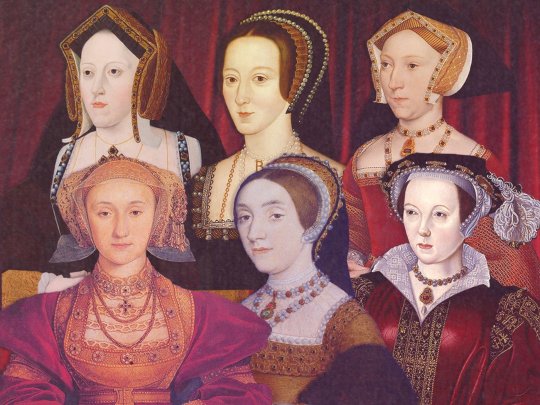
Meilan Solly
Associate Editor, History
Inspiration struck Toby Marlow during a comparative poetry class at Cambridge University in fall 2016. Participating in a discussion on William Blake, he found his mind wandering and began scribbling a series of unrelated notes: “Henry VIII’s wives → like a girl group … Need Lucy!!”
Then an undergraduate student tasked with writing an original show for the upcoming Edinburgh Fringe Festival, Marlow brought his idea to classmate Lucy Moss, who agreed to help bring his vision of a Tudor-themed pop musical to life. The product of the pair’s collaboration—Six, a modern reimagining of the lives of Henry VIII’s six wives—premiered on London’s West End in 2019 to much acclaim. (A cast soundtrack released in September 2018 similarly became an unqualified success.) Now, after an extended delay caused by the Covid-19 pandemic, the musical is finally making its Broadway debut.

L to R: Abby Mueller (Jane Seymour), Samantha Pauly (Katherine Howard), Adrianna Hicks (Catherine of Aragon), Andrea Macasaet (Anne Boleyn), BrittneyMack (Anna of Cleves) and Anna Uzele (Catherine Parr)
Liz Lauren
Six “didn’t come out of a love of the Tudor period particularly,” says Marlow, 26. “It came from us having an interest in the representation of women in musical theater, having women on stage doing funny and hilarious things.” Moss, 27, adds, “What we were interested in doing was reframing the way that women have been perceived in history and telling their side of the story.”
The Tudor period, with its “soap opera”-esque political machinations and rich cast of female characters, offered the duo the opportunity to explore contemporary issues like feminism through a historical lens. Though Six prominently features the rhyme historically used to describe the fates of the Tudor king’s queens—“divorced, beheaded, died, divorced, beheaded, survived”—the musical moves beyond these reductive one-word summaries to present its subjects as fully realized individuals. “With all of them,” says Moss, “there was so much of interest beyond the moment they got married or divorced.”
Marlow and Moss drew on a range of sources when writing Six, including Antonia Fraser’s The Wives of Henry VIII and documentaries hosted by historianLucy Worsley. The musical’s layered repartee deftly balances references to Tudor culture with nods to modern music, like the line “Stick around and you’ll suddenly see more” (a play on “Suddenly, Seymour” from Little Shop of Horrors). Still, Marlow explains, the show’s goal isn’t to convey history with 100 percent accuracy. Instead, “It’s [asking], ‘What if Anne Boleyn was like this?’ And how does that change the way you think about this very famous historical figure?”
youtube
Six frames its story as a makeshift talent competition in which the wife whose life was most tragic “wins.” The rules are simple: “The queen who was dealt the worst hand … shall be the one to lead the band.” Each wife sings a solo summarizing her experiences, engaging in acerbic banter in between verses. (During these numbers, the other wives act as both backup singers and dancers; beyond the six solos, the 80-minute show features three group numbers.) Ultimately, the women decide to form a girl band instead, leaving the king out of the narrative and imagining an alternate future featuring far happier ends for all of them.
Historian Jessica Storoschuk, who has written about Six extensively on her blog, has found that in school and popular culture, the queens are usually only talked about in terms of their fate. “[Six] is this kind of ridiculous satire of [that],” she says. “It’s a really intelligent way to explore their experiences, or, I should say, one part of their experiences, because their downfalls are not all of their lives.”
Below, find a song-by-song (or wife-by-wife) breakdown of the true history behind Six. Click through the interactive tools to learn more about specific lyrics from the show.
The song: “No Way,” a Beyoncé- and JLo-inspired “girl boss feminism” anthem, says Moss
Though Catherine of Aragon’s marriage to Henry lasted 24 years—collectively, his five other marriages spanned just 14 years—she has long been overshadowed by her successors. The daughter of Spanish monarchs Ferdinand and Isabella, Catherine came to England as the bride of Henry’s older brother, Arthur, Prince of Wales. But Arthur died shortly after the pair’s wedding, leading the Spanish princess to (eventually) marry his heir, Henry.
By all accounts, the couple enjoyed a loving relationship that only deteriorated due to a lack of a male heir and the king’s infatuation with Anne Boleyn. In the late 1520s, Henry sought a divorce from his first wife, arguing that her previous relationship with Arthur was the reason for the couple’s lack of a surviving son. Determined to protect her daughter Mary’s rights, Catherine refused to concede.
Apple News readers, click here to view this interactive.
Six’s account of these events, “No Way,” takes its cue from a June 21, 1529, meeting at Blackfriars in London. After years of debate over the validity of the royal couple’s marriage, a papal court was conceived to address the king’s so-called Great Matter. Appealing directly to her husband, Catherine fell to her knees and delivered an impassioned monologue:
Intending (as I perceive) to put me from you, I take God and all the world to witness, that I have been to you a true and humble wife, ever conformable to your will and pleasure. … If there be any just cause by the law that ye can allege against me, either of dishonesty or any other impediment to banish and put me from you, I am well content to depart, to my great shame and dishonor; and if there be none, then here I most lowly beseech you let me remain in my former estate, and receive justice at your princely hand.

A 1544 portrait of the future Mary I, Henry and Catherine’s daughter
Public domain via Wikimedia Commons

Portrait believed to depict a young Catherine of Aragon
Public domain via Wikimedia Commons
After uttering these words, Catherine left Blackfriars, ignoring the clerk’s calls for her to return. Without turning around, she declared, “On, on, it makes no matter, for it is no impartial court for me, therefore I will not tarry.” The queen was correct in her assessment: Henry had no intention of remaining in the marriage. Determined to wed Anne, he broke from the Catholic Church in order to make her his wife.
Catherine’s Six solo could’ve been a “super emotional [sad] ballad,” says Moss. Instead, she and Marlow chose to emphasize the queen’s defiance, emulating Beyoncé’s “Run the World (Girls)” and setting the tone for the rest of the musical.
The real Catherine followed through on her fictionalized counterpart’s pledge to remain “queen till the end of my life,” refusing to acknowledge her marriage’s annulment even on her deathbed in 1536. Catherine’s legacy, historian Julia Fox told Smithsonian magazine last year, “is that of a wronged woman … who did not accept defeat, who fought for what she believed to be right until the breath left her body.”
The song: “Don’t Lose Ur Head,” a “cheeky” number modeled on Lily Allen and Kate Nash, according to Moss
Arguably the most (in)famous of the six wives, Anne is alternatively portrayed as a scheming, power-hungry seductress; a victim of her callous father’s vaulting ambition; or a worldly, charismatic woman who rose to the kingdom’s highest office only to be targeted by jealous men.
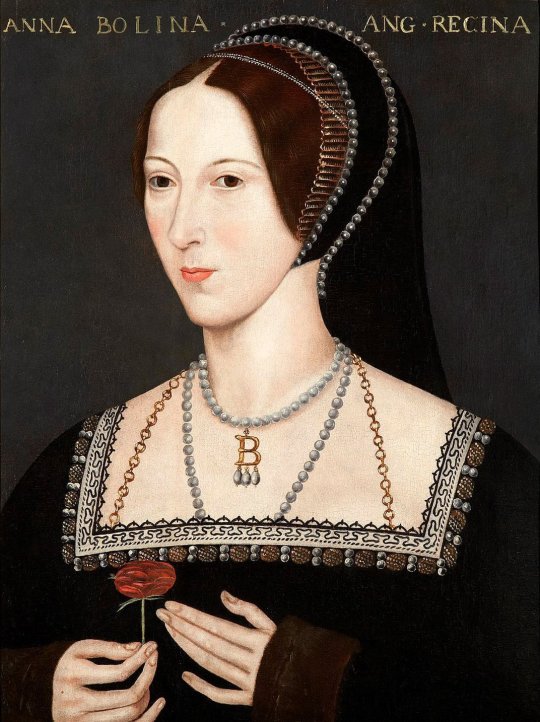
A near-contemporary painting of Anne Boleyn
Public domain via Wikimedia Commons
The truth of the matter depends on which scholar one asks. Most of Anne’s letters and papers were destroyed following her May 1536 execution on contrived charges of adultery, incest, witchcraft and conspiring to kill her husband, so much of what is known about her comes from outside observers, some of whom had reason to paint her in an unforgiving light. Even the queen’s date of birth, writes historian Antonia Fraser, is a fact “that can never be known with absolute certainty (like so much about Anne Boleyn).”
Anne’s song in Six, “Don’t Lose Ur Head,” draws its name from her method of execution: beheading by sword. Moss says she and Marlow view the number as a playful response to historians’ continued vilification of the queen as “calculating and manipulative”: “We were like, wouldn’t it be fun to mock [that trope] and make it that she was like ‘Well, I’m just living. I did this thing randomly, and now everything’s gone crazy.’”
Apple News readers, click here to view this interactive tool.
Though the tone of “Don’t Lose Ur Head” is intentionally more irreverent than the real queen, who Storoschuk says “was incredibly shrewd, very well educated, well read and well spoken,” the broad strokes of the song are historically accurate. Anne spent her teenage years in the courts of Margaret of Austria and Francis I of France, gaining a cosmopolitan worldview that helped her stand out in England. When she caught Henry’s eyes, she was a maid of honor in service of his first wife; rather than becoming Henry’s mistress, as her sister Mary had, Anne refused to sleep with the king until they were married. To wed Anne, Henry broke with the Catholic Church and established himself as head of the Church of England. Finally, the once-besotted king fell out of love in dramatic—and, for Anne, fatal—fashion just three years after their long-awaited marriage.
The song: “Heart of Stone,” a slow, Adele-like ballad
Henry’s third wife, Jane Seymour, has gone down in history as the “boring” one. According to Fraser, she was intelligent and “naturally sweet-natured,” with the “salient characteristics [of] virtue and common good sense.” Historian Alison Weir similarly describes Jane as “endowed with all the qualities then thought becoming in a wife: meekness, docility and quiet dignity.”
Moss and Marlow tried to flesh out these descriptions by highlighting Jane’s political savvy. During her comparatively brief courtship with Henry, Jane drew on many of the same tactics used by Anne Boleyn, most notably by refusing to sleep with him until they were married. Presenting a submissive front may have been a tactic, says Moss. It’s also worth noting that Jane used her position to advance causes she cared about, including restoring her stepdaughters, Mary and Elizabeth, to their father’s favor and speaking out against the closure of England’s religious houses.
Apple News readers, click here to view this interactive.
On one occasion, Henry reportedly dismissed his new wife by advising her to “attend to other things, [for] the last queen had died in consequence of meddling too much in state affairs.” “Heart of Stone” acknowledges this risk, but Six’s version of Jane chooses to remain steadfast in her love of Henry and their son, the future Edward VI.
Following Jane’s death in childbirth in 1537, Henry memorialized her as “the fairest, the most discreet and the most meritorious of all his wives”—a distinction no doubt motivated by the fact that she’d given the king his only surviving male heir, writes Weir. (Edward took the throne “Six” reflects this enviable status by identifying Jane as “the only one he truly loved.” As she herself acknowledges in “Heart of Stone,” however, Henry’s affection is conditional on her ability to provide him with a son.

Henry chose to include Jane, rather than his then-wife, Catherine Parr, in this dynastic portrait. Painted around 1545, the work depicts Edward, Henry and Jane at its center and Mary and Elizabeth in the wings.
Public domain via Wikimedia Commons
Speaking with Vulture last year, Moss said, “The idea was about the strength of choosing to love someone and committing to someone, and that being an equally valid feminist experience.” She added, “I love that [Jane] gets to say, ‘I wasn’t stupid, I wasn’t naïve.’”
The song: “Get Down,” a 16th-century take on the rap and hip-hop “trope of being popular and bragging about your Ferrari and your Grey Goose,” says Moss
Anne (or, as the musical calls her, Anna) of Cleves was, in some historians’ view, the most successful of Henry’s six queens. After just six months of marriage, she earned the king’s enduring affection by agreeing to an annulment. Then, she proceeded to outlive her former husband, not to mention the rest of his wives, by a decade. “[Anne] did get pushed to the side in a rather unceremonious way, but she had a pretty good life,” says Storoschuk. “She was given several properties. She gambled a lot. She got to go hunting, she had the best clothes and the best food. She was loved at court.”
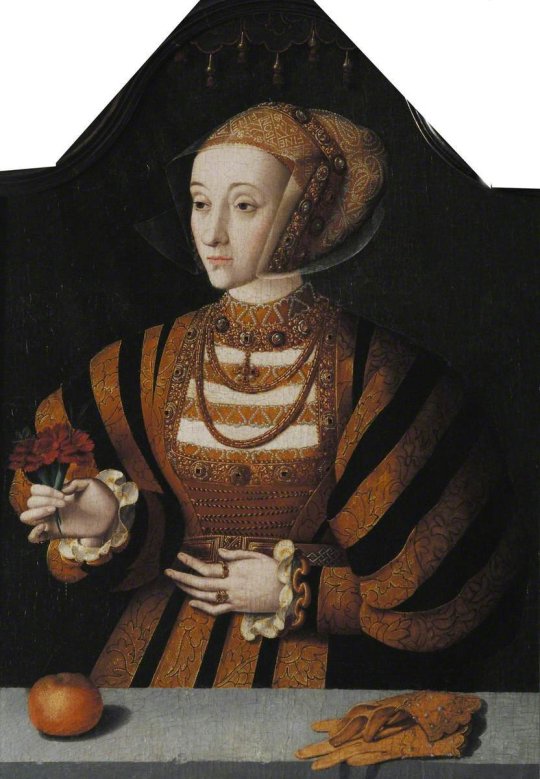
A 1540s portrait of Anne of Cleves by Bartholomaeus Bruyn the Elder
St. John’s College, University of Oxford, via Art U.K. under CC BY-NC-ND
“Get Down” focuses on this victorious period in Anne’s life, celebrating her independence as a wealthy, unmarried woman at Tudor court. In line with the musical’s goal of reclaiming the narrative, the number also reframes the incident that led to Anne’s annulment. Henry, enchanted by a flattering Hans Holbein portrait of his bride-to-be, was reportedly repulsed by the “tall, big-boned and strong-featured” woman who arrived in England at the beginning of 1540. Declaring “I like her not! I like her not!” after their first meeting, the king only went through with the wedding to maintain diplomatic ties with Anne’s home, the German Duchy of Cleves, and other Protestant allies across the European continent.
After just six months of marriage, Henry, eager to replace his short-reigning queen with the young, vivacious Katherine Howard, had the union annulled on the grounds of non-consummation and Anne’s pre-contract with Francis, Duke of Lorraine. Anne, from then on known as the “king’s beloved sister,” spent the rest of her days in luxury.
Apple News readers, click here to view this interactive.
Moss studied history at Cambridge and says much of her schoolwork centered around early modern German visual culture. Six actually includes a standalone song, “Haus of Holbein,” that satirizes 16th-century beauty culture and Henry’s portrait-driven search for a fourth wife: “Hans Holbein goes around the world / Painting all of the beautiful girls / From Spain / To France / And Germany / The king chooses one / But which one will it be?”
Given Holbein’s reputation for accuracy and Henry’s own declining looks (at the time of the couple’s wedding, the king was 48 years old), Marlow and Moss chose to turn the tables, having Anne proclaim herself a fan of the much-vilified portrait. Further cementing Anne’s mastery of the situation, “Get Down”’s refrain finds the supposedly unattractive queen hanging up her likeness “for everyone to see.”
The song: “All You Wanna Do,” a catchy number modeled on the work of “young pop stars sexualized early on in their careers,” like Miley Cyrus, Britney Spears and Ariana Grande, as Marlow told Vulture
For much of history, Henry’s fifth wife, Katherine Howard, has been dismissed as a wanton woman of little import. Writing in 1991, Weir described her as a “frivolous, empty-headed young girl who cared for little else but dancing and pretty clothes.” Fraser, meanwhile, wrote that “[h]ere was no intelligent adult woman, wise in the ways of the world—and of course courts.” More recent scholarship has taken a sympathetic view of the queen, with Gareth Russell’s 2017 book, Young and Damned and Fair, leading the conversation. As Russell argues, “[Katherine] was toppled by a combination of bad luck, poor decisions, and the Henrician state’s determination to punish those who failed its king.”
Katherine’s Six solo, titled “All You Wanna Do,” echoes Russell’s characterization of its subject as a victim of circumstance and predatory older men. Though her exact birthdate is unknown, Katherine may have been as young as 17 when she was beheaded on charges of treasonous adultery in February 1542. Henry, comparatively, was 50 at the time of his disgraced wife’s execution.
Apple News readers, click here to view this interactive.
The king was far from the first man to sexualize Katherine. “All You Wanna Do” details the queen’s relationships in heart-wrenching detail, from a liaison with her music teacher, Henry Manox (the song suggests that he was 23 to Katherine’s 13, but as Storoschuk points out, he may have been closer to 33), to an affair with Francis Dereham, secretary to the dowager duchess, Katherine’s step-grandmother. When each new romance begins, the teenager declares herself hopeful that this time will be different. By the end of the song, however, she realizes that all of her suitors have the same goal in mind.
According to Moss, she and Marlow wanted Katherine’s song to start out with a “sexy, seductive” tone before transforming into a “narrative of abuse” with echoes of today’s #MeToo movement. Marlow adds, “It was kind of like us talking about what happened to one of the queens and finding a way of relating it to something that we would recognize as a modern female experience.”
Katherine’s “life was so tragic,” says Storoschuk. “She was so young, and she really had very little agency over her own life. ‘All You Wanna Do’ really encompasses that.”
The song: “I Don’t Need Your Love,” a soulful, Alicia Keys–inspired love song
Often reduced to the one-word summary of “survived” or the role of nursemaid to a succession of ailing husbands, Henry’s sixth wife, Catherine Parr, was actually a renowned scholar, religious reformer and perhaps even protofeminist. In Six, she takes ownership of these attributes, refusing to be defined by her romantic relationships and instead listing her manifold accomplishments: “Remember that I was a writer / I wrote books and psalms and meditations / Fought for female education / So all my women can independently study scripture / I even got a woman to paint my picture.”
Apple News readers, click here to view this interactive.
As the last of the six to take the stage, the fictionalized Catherine has dual obligations: namely, sharing her story and setting up a satisfying musical finale. “We needed one of the queens to be like ‘Wait, we shouldn’t be competing with each other. We should support each other,’” says Moss. “Fortunately, [Catherine’s role] as a writer, educator and advocate for women helped with that.” Encouraging the wives to take back the microphone, Catherine calls for them to assert themselves outside of their marriages to Henry. “It’s not what went down in history,” the six admit, “[b]ut tonight, I’m singing this for me.”
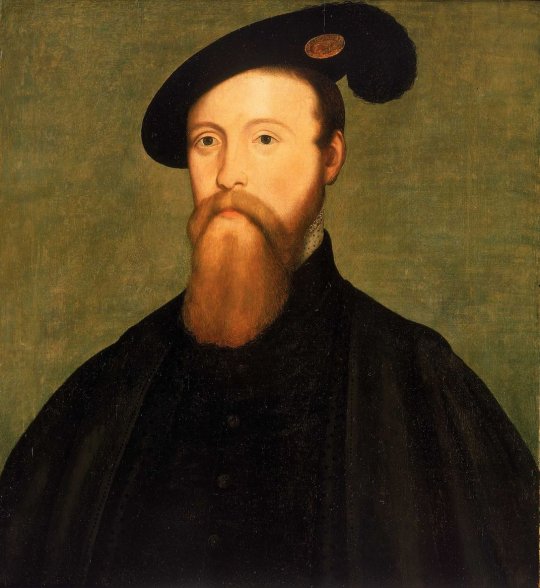
Catherine Parr’s fourth husband, Thomas Seymour
Public domain via Wikimedia Commons
The real Catherine led a rich life beyond what’s captured in “I Don’t Need Your Love.” As alluded to by the song’s first verses, which find Catherine telling a lover that she has “no choice” but to marry the king, the twice-married young widow initially had another suitor in mind: Thomas Seymour, the dashing younger brother of Henry’s third wife, Jane. (The would-be couple wed soon after Henry’s death in 1547, but their marriage was tainted by Thomas’ improper conduct toward his new stepdaughter, the future Elizabeth I.)
Despite being forced into a relationship with Henry, Catherine made the most of her position, pushing her husband to embrace Protestantism and encouraging him to restore his daughters to the line of succession. She narrowly escaped an attempt by the court’s conservative faction to have her executed on charges of heresy, winning back Henry’s favor even after he’d signed a warrant for her arrest. Catherine died just a year after the king, succumbing to complications from childbirth in 1548.
youtube
Based on a True Story
British History
Elizabeth I
England
Henry VIII
Kings
Medieval Ages
Monarchs
Musical Theater
Pop culture
Queens
Theater
Tudors
#History
1 note
·
View note
Text
“this is not going to go the way you think”
(this was initially a comment on @trashywestallen’s blog that has now evolved into a full, 6500 word crazy meta. send help)
Or, the Lorca/Burnham meta that just wouldn’t quit and that nobody asked for.
Warning: those are just my ramblings/wild theories based on too much watching of the show, too little sleep, and some literary/cinematographic analysis.
Expect spoilers up to episode 10.
A lot of people on the Star Trek subreddits have been complaining that some of the plot twists so far on DSC have been too obvious (specifically, the Voq/Ash theory and the mirror!Lorca theory). Setting aside the fact that most of the general audience (who do not spend as much time as we do analyzing every word and frame) probably did not see those twists coming, at all…
I have a nagging feeling that there is another plot twist that has been under our nose this whole time.
I think Lorca is mirror!Lorca and was involved (romantically) with mirror!Michael. There, I said it. Worse: it was serious (perhaps she was even his wife, though obviously it would have had to be a secret).
Either mirror!Michael was helping him secretly against the Terran Empire and was in on the coup, or more tragically, she wasn’t and was actually sent to stop him. She died, or was presumed dead: but the show was careful to mention it wasn’t Lorca who “killed” her, it was one of his followers (seems like an odd distinction to make, no?).
That’s a pretty radical theory, I admit. But bear with me for a while, will you?
Episode 10: the turning point
Three major plot point stand out immediately:
”Amazing isn’t it? Different universe, and somehow the same people had a way to find each other. Strongest argument I’ve ever seen for the existence of destiny.”
Their whole conversation in Lorca’s ready room is fascinating, but I’ll focus on the most relevant parts.
First off, while “finding each other” can apply to multiple people, it’s usually used for two. Lorca is almost certainly talking about the two of them here, not the crew in general.
And then, that bombshell... “destiny”. Defined as, “the hidden power believed to control future events; fate.”
That’s a pretty strong word to use. Essentially, Lorca is suggesting that fate has brought the two of them together, in this universe… and maybe even in another (mirror) universe.
Ever logical, Michael immediately rejects the very idea.
“I’m not sure I believe in the existence of destiny.”
This sort of talk is way too much for Michael to handle right now. She was raised on Vulcan: logic informs her thinking. But what Lorca is trying to tell her has nothing to do with logic. She just doesn’t hear him at all.
The rest of their conversation continues in a similar vein:
“Part of you had to know that wasn’t the end of your story (...) You were destined for something more.”
“Destiny did not get me out of prison, Captain. You did that.”
Two ways of looking at the same thing: one poetic and even romantic; the other factual and rational. And perhaps they are both right, from their perspective: after all, if Lorca really is mirror!Lorca, who has lost his own Michael, only to find her again in another universe… that would be pretty incredible.
As he often does, Lorca immediately deflects:
“Let’s agree to disagree. For now.”
That “For now” is also important. Is there something that could realistically change her mind in the future, that he knows about and we don’t? Only Lorca knows.
Visually the scene is also very telling. They start off separated by his desk (which Lorca uses to create a barrier between them in many scenes, notably their first meeting) but then at his invitation, they move to the window, where the camera frames them with alternating two-shots (used primarily to establish links between characters) and close-ups (to create intimacy and focus on emotional reactions). There are also a few shots of them from behind, with their reflections in the window as well.
Mirror? Reflection? Did you want fries with your symbolism? (Note that shots of Lorca looking out a window with his reflection appearing also happens at least in episode 3, when Michael and Lorca first meet, and episode 6, after the whole Katrina debacle. They’ve not been subtle with this use of imagery).
- Not a scene but more a general feeling throughout the episode. How many times have we seen Michael touch Lorca previously? I’ll help you: exactly once, and honestly it barely counts (at the end of episode 3, when Michael takes a fortune cookie from his hand). As for Lorca, he never touches her.
Yet in this episode? Michael is all over him, starting from that moment on the bridge where she lays a hand on the small of his back to interrupt him (before that whole Scottish accent thing). That has literally never happened before.
Don’t even get me started on the whole hair and neck stroking she has going on later. In fact, as soon as she steps into her Terran persona she becomes a lot more tactile – only with Lorca, mind.
Now, I don’t know whether this means Michael is attracted to him or not – at least not consciously! – and in fact this might not even be the point.
Rather, those touches serve to establish and anchor a sense of physicality between the two of them, for us the audience. Essentially telling our unconscious minds:
“Look, here are are two very attractive people (that leather jacket, oh my lord) that are touching each other. The line has been crossed. Make of that what you will.”
I predict we will see an influx of new people wondering about the Lorca/Michael dynamic after watching episode 10, wondering if there was indeed something there or if they are imagining things.
- The ending scene! Either this is a very clever juxtaposition, or some super strange editing. Since TPTB have been doing excellent work on filmography so far, I’m hoping it’s the former.
I’m talking about the “love” scene between Tyler and Michael (and I use parenthesis here not because I dislike Ash/Michael -- I don’t -- but because at this point neither he nor Michael know who he is, or what he is, and … he just killed Culber in cold blood so… yay romance?) followed immediately by Lorca in the agonizer booth, screaming in pain.
Now that’s an odd editing choice. Or is it?
Cinematically, a cut like that is a common technique: it’s called cross-cutting, and is often used to show than two actions are happening at the same time.
According to Wikipedia:
“This creates a sharp dichotomy between the two actions, and encourages the viewer to compare the two shots. Often, this contrast is used for strong emotional effect (...).”
If we go back to the theory that mirror!Lorca and mirror!Michael were together, as more than just reluctant allies, and that he has feelings for both versions of her (yes, prime!Michael too after learning to know her)…
Well, Michael and Tyler consummating their relationship brings utter and complete agony to Lorca.
This is all symbolic, of course, but re watching the scene with all this in mind… It’s chilling. Tyler above Michael, the scene telegraphing that they are about to have sex…
Cut to Lorca screaming in the agonizer booth.
At the very least, they are implying some fairly dark things about Michael/Tyler going forward, but I also think it’s significant that Lorca is the one shown in pain here.
An aside: Michael/Tyler, from Ash to ashes
Poor Michael. Poor Tyler. I’ve been sure of the whole “Ash is Voq” thing almost since his introduction (remember the eye wound Michael inflicts on Voq in episode 2? Now check Tyler’s same eye in episode 5. Go on. I’ll wait.) but I thought there might be hope for them somehow, despite the fact that both had killed each other’s mentors (eaten, actually, in Voq’s case…)
Until episode 10.
I won’t dwell too much on the fact that, out of all the possible scenarios for Ash/Voq, we ended up with the worst one for their future: Tyler is Voq, physically and mentally -- not the other way around. The Tyler personality is an overlay, and we don’t know yet how much of that personality is real. But regardless: the body belongs to Voq.
I would have had a lot more hope if Tyler had been physically Tyler, with Voq’s personality implanted somewhere inside. This duality could have allowed a positive resolution for the plot line (driving out Voq’s consciousness, for example) and therefore their relationship.
Moving on.
Tyler/Voq murders Culber in cold blood (or so it seems to the audience), then proceeds to break into Michael’s room (and yes, this is meant to feel slightly creepy, even out of character for Tyler, who has so far respected her boundaries) and seduces her.
Everything is consensual but feels a bit… off. And for good reason.
They are surrounded by enemies, Michael is emotionally shaken from having had to kill a familiar face/friend (and the ironic juxtaposition of their two kills, one a cold-blooded murder, the other an act of self-defense, is just heartbreaking), and Lorca is being horribly tortured a few decks below.
Yikes.
Sex, and death, and pain. Those are not good things to put together when hoping for a happy ending. Symbolically there is no going back from this, I don’t think.
If they had consummated their relationship previously, in a more positive setting, I could still see their romance perhaps going in a positive direction (at least this would have been a good sign, though Culber’s fate might have made that moot as well).
As things stand, it feels like watching the death warrant of their relationship being signed and… ouch.
Poor Michael. Talk about a devastating first love.
Did someone say first love?
Interestingly there is a common trope pair, “First Love” / “Second Love”, that is often combined with “Wrong Guy First”. From TVTropes:
“This is the plot that results when a Love Triangle is used to illustrate the Aesop "Be Careful Who You Give Your Heart To".
Our heroine is a young woman with two suitors. Suitor #1 (...) seems to be everything a young woman would want. But he's not. Suitor #2 appears to be flawed. (...) If he's handsome, he's not as handsome. He could be many years older than our heroine. He often has the kind of personality that makes him hard to get to know.”
There are many literary examples of this trope, from Jane Austen, Tolstoy, or Dickens, all the way to Harry Potter or even the Hunger Games.
But no, wait. That can’t be right. It’s not like there is someone else who has been watching over Michael from the side lines since the beginning.
Right?
Well...
“I did choose you” : Going back to the beginning
After having this “red alert something is happening here” moment while watching episode 10, I went back and re-watched most of Lorca and Michael’s earlier interactions with this theory in mind.
(As a general note, I think Lorca generally avoids lying outright and prefers a more… Obi-wan approach. “What I told you was true, from a certain point of view.”)
Episode 3: First meeting and new beginnings
Their first meeting is almost theatrical in its setting. Michael enters a darkened room, and Lorca has his back to her, facing the window (where, again, his reflection can be seen). He is clad (armored, really) in darkness and mystery.
Lorca initially sounds almost like he is flirting:
“I like to think it makes me mysterious. No?”
“Don’t be shy.”
When I watched the episode for the first time, I thought it might be part of his personality (like Kirk) but no. He does not do this with other people. Only Michael.
In fact, I now think he is deflecting. The whole situation is somehow painful or difficult for him, and he uses humor to hide it. Which of course falls utterly flat, because Michael does not really get humor (at least not at this point).
He keeps his back to her for a long time, and even takes a breath before turning around, as though he has to fortify himself before seeing her.
Now that doesn’t make a lot of sense at face value, if Lorca is just a captain and Michael just a mutineer.
But it is a lot more understandable if Lorca is mirror!Lorca and the last time he saw Michael was before she (well, her mirror counterpart) died.
Because of him.
Lorca then comes to stand behind his desk, in a move he will be shown to use often in the future. Make no mistake, this is a highly defensive maneuver.
They talk about Michael’s shuttle being diverted, and no surprise, Michael’s logic bluntly dispels Lorca’s attempts at plausible deniability. (Something, by the way, that happens many times in the series: she rarely lets him get away with misdirection. Though amusingly she has also, so far, never caught up with what he is actually trying to hide.)
To which Lorca says:
“Maybe the universe hates waste.”
Considering their discussion in episode 10, similarly in Lorca’s ready room, this line takes on a lot more meaning. He is referring to destiny here, although obliquely.
Visually, two things happen in succession: Lorca has a little half smile, and then tilts his head and holds her gaze for a long moment. Now what does body language have to say about that?
“In courtship, the head tilt shows a playful and engaged attitude. It shows interest but can also be a tease (especially when combined with a half smile and sideways glance).”
Lorca is definitely flirting with her this time. In fact, his next move supports this idea. He moves around the desk and comes to stand in front of her. He does not completely leave the security of the desk, mind, instead choosing to lean against it (a sign of insecurity) while his shoulders are set back in a classic power pose.
Michael is startled and takes a few steps back, swallowing. I don’t think she is scared of him, not on a conscious level. But on an unconscious level, we have a (presumably) virginal or inexperienced young woman suddenly approached by an older, attractive man who has been flirting with her (though I doubt she consciously noticed). She is shaken.
He either doesn’t notice, or (more likely) pretends not to notice and basically offers her a job. She refuses (not just the job, but the whole Call to Adventure -- more on that later).
He tells her she doesn’t have a choice.
This is a crucial moment. Lorca talks to her harshly, tells her there are no free rides on his ship (ironic, since he is the one that dragged her here!) and that she will be put to work. Almost at once, he moves back behind the safety of his desk, walls firmly back up. He will be the “bad guy” because she needs him to be, but he is not enjoying it.
Make no mistake, Michael needs it. At this point in her story, she has lost hope. She is a ghost of her former self. She was right about the Klingons, but with the guilt of Georgiou’s death, she had taken on the guilt for the whole war as well. She is depressed, withdrawn. She has given up.
What Lorca does is put her back on her feet. He gives her a job, a purpose (however temporary), and even a mystery to chew on (of course he knew she was going to try to break in, and he wanted her to -- that’s why he assigned her to Engineering).
He reminds her of who she was (“You were once a Starfleet officer.”).
Of course, at that moment, she doesn’t see his actions as a gift, but rather a burden, an obligation. If she had the energy for it, she would resent him.
It will take her three episodes to process and express her gratitude for the second chance he has given her (more on that later).
Lorca does all this obliquely, as he does many (most) things. In fact, I believe he does not want Michael to be grateful to him (perhaps out of guilt). Mind you, he is also testing her: Lorca is a pragmatist. And if he is mirror!Lorca, he doesn’t know this version of Michael yet, and what she is capable of.
When Michael leaves with Landry, there is another closeup on Lorca’s face, and he has this very odd expression. Like this has affected him, was hard on him, somehow.
This makes no sense at all if Lorca is prime!Lorca and is simply meeting a mutineer he wants to recruit. But even if our Lorca is indeed mirror!Lorca, why would meeting Michael’s prime counterpart affect him so? Unless there is more to it than meets the eye.
At the end of the episode, we go back to Lorca’s ready room, in a lovely symbolic mirroring/book-ending of their first meeting.
Lorca is looking every inch the Captain, standing firmly behind his desk, arms wide, shoulders straight. Again a classic power pose. He offers her a position aboard Discovery. She initially refuses him again but this time, she doesn’t back down.
I can’t emphasize how different Michael’s behavior is in both encounters.
When they first meet, she is defeated, submissive, withdrawn. When she refuses Lorca’s first offer, it is weakly, and he steamrolls her objections without difficulty. When he steps closer to her, she steps back. She looks down at the floor.
In this scene, however, Michael has regained her confidence. She looks Lorca straight in the eye when she refuses him, and he is on the defensive (or seems to be). She flings his question (“Why would you refuse?”) back at him (“Why do you want me to stay?”) and even stalks toward him.
Of course, Lorca being Lorca, Michael doesn’t quite get to keep the upper hand for too long. She gets derailed into a rant about Lorca developing and testing biological weapons, which then veers into a slightly pompous speech about being a Starfleet officer to the death.
Meanwhile, Lorca is smiling, a fond smile (that almost seems out of place considering he is supposed to have met her a couple of days before). This is what he has been planning all along. His experiment was successful.
His next sentence is very telling:
“I know exactly who you are, Michael Burnham. I know exactly who you are.”
Well, well.
Essentially, he is implying here that either he knows her because… he actually knows her (and that should not be possible); or he knows her because they are the same. They are kindred spirits.
Either way, it’s a fairly odd thing to say to someone you’ve known for a few days!
Still smiling fondly, he stops her from making more of a fool of herself and proceeds to dazzle her with his shiny new technology. He is really pulling all the stops here to impress her, even taking her on a virtual tour of the galaxy.
And then he outright admits it:
“I did choose you (…) but not for the reasons you think.”
This sentence works on so many levels, it’s pretty incredible. Note that she asked him why he wanted her to stay; and he answers that he chose her. Those are not even remotely comparable in terms of emotional involvement.
Then the camera switches to choker shots (tight close-up shots that cut off above the eyes and under the mouth/chin) which are traditionally used to create … romantic tension. Or at the very least emotional tension.
Lorca holds out his hand, with a fortune cookie in it (fortune cookie which she refused in their initial meeting, mirroring!).
(No time to discuss in too many details, but in fortune cookie, there is ���fortune”... another reference to fate/destiny.)
She takes the fortune cookie from his hand. This time, she accepts his offer, and symbolically, the Call to Adventure.
An aside: Michael’s hero journey
I have mentioned the Call to Adventure a couple of times now, and I realize it might be helpful to take a brief detour into the Hero’s Journey before we continue.
The Hero’s Journey, or monomyth, is a template of narrative analysis that is widely used in storytelling. It is not absolute, or perfect (it has received its fair share of criticism) but so many stories follow these patterns that they have become embedded in our collective unconscious. As such, they can be helpful in understanding the symbolic underpinnings of a story.
The Hero’s Journey (according to Campbell, who first wrote about it in 1949) is broadly composed of 3 acts (Departure, Initiation, Return), further divided in 17 stages.
For the purpose of this meta (and considering DSC is only in its first season!), I will focus mostly on the first stage, Departure.
(Note that not all stages need to be used in a story, nor do they need to happen in a linear fashion. They may also happen multiple times, in multiple forms.)
The call to adventure
The refusal of the call
Supernatural aid/meeting the mentor
Crossing the first threshold
The belly of the whale
Acceptance of the call
When we meet Michael again in episode 3 (which narratively is the beginning of the story, with episodes 1 and 2 serving as a prologue), she is a broken woman. So heavily laden with guilt, in fact, that she has essentially given up and turned her back on everything she is and believes in.
When Lorca offers her a (temporary) job on Discovery, she turns him down. On paper, this looks like a textbook refusal of the call, and it is. But looking deeper, even before she comes aboard Discovery, Michael has already refused it, and in fact, has been refusing it for a while.
"Refusal of the summons converts the adventure into its negative. Walled in boredom, hard work, or 'culture,' the subject loses the power of significant affirmative action and becomes a victim to be saved. [Her] flowering world becomes a wasteland of dry stones and [her] life feels meaningless. (...) All [she] can do is (...) await the gradual approach of [her] disintegration." (Campbell)
From the moment Captain Georgiou dies, Michael shuts down. She refuses all attempts to move forward, essentially locking herself away and throwing away the key. She has given up on herself. This is Michael’s true refusal of the call.
“The mentor gives the hero the supplies, knowledge, and confidence required to overcome his or her fear and face the adventure.” (Christopher Vogler)
Lorca then plucks her from her prison, as if by magic, and sets her to work on his ship. This is the supernatural aid/meeting the mentor stage.
"With the personifications of [her] destiny to guide and aid [her], the hero goes forward in [her] adventure until [she] comes to the 'threshold guardian' at the entrance to the zone of magnified power.” (Campbell)
Lorca then sends Michael to the Glenn, along with Stamets, Tilly and Landry. This plot point represents both the Crossing of the First Threshold and the Belly of the Whale stages, combined.
At Lorca’s orders, and despite herself, Michael has to leave the safety of Discovery for the danger of the Glenn. This is her first mission since her mutiny, and since she turned down the call. She is forced to cross the threshold of the boundaries, the walls she has drawn around herself.
“It is a turning point in the Hero’s Journey where the hero is swallowed by a larger monster or representative of evil and comes out with a new sense of self. The hero is consumed but emerges alive. (...) and [comes] to terms with death.” (Gordon Napier)
“That is why the approaches and entrances to temples are flanked and defended by colossal gargoyles: dragons, lions, devil-slayers with drawn swords, resentful dwarfs, winged bulls. The devotee at the moment of entry into a temple undergoes a metamorphosis.” (Campbell)
On the Glenn, everything is dark and scary. There are dead bodies, horribly disfigured. There is a monster roaming. Michael barely escapes with her life, after crawling through tunnels with the tardigrade in pursuit, before jumping into the shuttle at the last possible moment (quite heroically I might add). This stage is the metaphorical Belly of the Whale.
Incidentally, an important theme throughout the episode, and especially the tardigrade pursuit, is “Alice in Wonderland”: a vivid tale where physical metamorphosis, the search for identity and the hero’s journey all play a prominent role.
After Michael faces her trials successfully, she starts to remembers who she is: a Starfleet officer. She has begun to process her grief and can now start her hero’s journey anew (a journey of healing and growth).
Later, when Lorca offers her a permanent position on Discovery, Michael accepts both his second offer and the symbolic call to adventure (after a fair bit of convincing).
And she does it on her own terms, too: if Lorca had been working on a biological weapon, she would have refused him, but not for the same reasons she had turned him down initially. Not out of fear and self-doubt, but with a renewed respect for herself and her beliefs.
She has started to remember that she is a hero.
There are many other aspects of the Hero’s journey when it comes to Michael in Star Trek Discovery, but this goes beyond the scope of this already huge meta.
Episode 5: Keeping secrets
Episode 5 doesn’t technically have any direct interactions between Michael and Lorca. There is, however, a fairly significant scene between him and Katrina Cornwell, on the matter of our favorite mutineer.
Halfway through their fight, the admiral asks Lorca an enormously important question:
“(...) Why give everyone another reason to judge you?”
Of course, Lorca immediately deflects with another question of his own, putting Katrina on the defensive. And he never actually answers the question, which means that whatever it is, it’s important.
Episode 6: Shadows and mirrors
After Michael senses Sarek’s pain and collapses, Lorca is right there at her bedside when she awakens. Does he usually do this for his crew? Somehow I doubt it.
Then Michael asks him to mount a rescue for Sarek and… Lorca does it. No questions asked.
He defies a direct order from Starfleet, which later on brings down Cornwell’s inquisition on him (by the way, she’s a psychiatrist who thinks nothing of sleeping with someone she considers psychologically unstable? Hmm.). He ends up in real danger of losing his ship. All this because Michael said please.
Then there is of course the infamous conversation between Lorca and Tyler in the shuttle:
“Bring her back in one piece.”
“Not a scratch.”
“I’m talking about her. Or don’t come back at all.”
First off, wow. Lorca is definitely overreacting here. This is not normal Captain behavior. In fact, Tyler’s reaction (thinking Lorca meant the shuttle) is much more logical than what Lorca actually means (“Anything happens to Michael, you’re a dead man”).
Whether he means it 100% is up for debate, but the message is crystal clear: this is a threat.
Bring her back to me or else.
Note that at no point in this conversation does Lorca feel the need to refer to Michael by name, simply using “her” as though it was obvious who and what he means. And to him, it is. But to poor Tyler, or even to the audience, this serves to point out the stark disconnect between normal concern over a mission vs. abnormal worry over a particular individual.
Before leaving, Lorca claps Tyler on the arm and this feels like a dominant gesture, a way to establish a hierarchy that has nothing to do with Starfleet’s. Especially after their friendly chat/threat.
Upon first watching the episode, this scene seriously made me raise an eyebrow because he sounds way too protective/possessive for a captain just caring about a crew member (and not Tilly or Tyler, who are also going on the mission, remember?).
At the end of the episode, Michael thanks Lorca, pointing out that he didn’t have to save Sarek. Lorca answers, truthfully:
“I didn’t do for him.”
He then adds that he needs his team at peak form but those are just empty words. At no point in the series does he ever choose an individual crew member’s needs over the ship/the mission. In fact, being the pragmatist that he is, he does not hesitate to put them in danger if the mission requires it (see Stamets -- though I honestly don’t believe Lorca knew or could have foreseen what would happen to him when they made that last jump).
Except when it comes to Michael.
Finally, we are offered a shining example of the rule of threes (commonly found in fairy tales, but not only). From TVTropes:
“The Rule of Three is a pattern used in stories and jokes, where part of the story is told three times, with minor variations. The first two instances build tension, and the third releases it by incorporating a twist.”
Lorca makes her a third and final job offer: a place not only on Discovery, but on the bridge, as science officer. By his side.
In a reversal of the previous offers, Michael accepts at once, without an ounce of hesitation. She does not need any convincing.
She also says something quite meaningful, in light of her initial reactions to his first two offers:
“I am grateful… to serve under a captain like you.”
Characteristically, Lorca seems to refuse her gratitude. He looks startled, says nothing, just offers a small smile then walks away.
At this point in their story, we don’t know if this is out of guilt (atonement), his personality or even a narrative continuation of the “Wrong Guy First” trope, where the sidelined suitor is still trying to ensure the heroine’s happiness. Perhaps a mix of all three.
Episode 9: On the bridge we fight
Pahvo is in danger. Discovery, by association, is in danger. The Federation is in even more danger than usual because of the Klingon’s stealth technology.
Lorca decides to send a team to place beacons on the Klingon ship. He picks Tyler, and Tyler picks Michael, as she is the most qualified for the job.
And Lorca just goes, “No way, Michael’s not going, it’s too dangerous”. Too dangerous for her, but not for the other crew members sent on the boarding party, mind you. Including Tyler who is standing right here.
As is quickly becoming her habit, Michael just insists and proceeds to bludgeon Lorca with her logic while the rest of the crew (and the audience) tries to understand what is going on.
Lorca looks supremely uncomfortable. His whole posture is one of avoidance. He sits down onto his chair and seems to just shrink on himself, turning away from Michael in clear dismissal. He avoids her gaze, snaps at her and even resorts to orders (something he hasn’t done since their first meeting).
“Sir, you offered me a place on this ship.”
“And now I’m ordering you to stay!”
Meanwhile, everyone else on the bridge is just watching them in disbelief, and with no small amount of discomfort. They do not understand what they are witnessing -- a battle of wills.
Until finally Michael, reaching the logical conclusion of Lorca’s odd behavior, stumbles onto the truth:
“There is no logic to your thinking. Unless this is about me.”
At that Lorca finally has to look at her, but he doesn’t say anything because there is nothing to say. She is right on both counts: he is not being logical at all, and this is about her.
Amusingly, Michael still manages to miss the point completely, misreading Lorca’s agitation and protectiveness by viewing herself as a resource (to be hoarded) rather than a person (to be protected).
I honestly felt bad for Lorca in this scene. If Michael were even a tiny better at understanding feelings, in herself or in others, she would probably realize that his behavior is not normal. But she is oblivious, for which Lorca is probably very thankful.
After that, well, she has basically put him on the spot, and in front of the whole bridge to boot. He glances at Saru, then back at Michael. He has lost and can only concede. He has no more arguments beyond, “I am afraid to lose you” and that is not something he can say.
(Mind you, if this scene had been between the two of them in private, without the whole bridge watching, he would never have allowed her to go. Logic be damned.)
So Lorca finally relents, but you can tell it’s against his will. Like pulling teeth.
He even orders her to come back safely (but not Tyler, who is also going on that super duper dangerous mission and is standing right here!) Then we have another shot of his face, looking pretty damn unhappy. Wretched, even.
Possessing the emotional intelligence of a brick (and I say that as someone who loves the character), Michael thanks him and looks satisfied. For her the matter is resolved.
She totally doesn’t realize that:
She, a convicted mutineer, has just pitted her will against her captain’s and won.
She should be in the brig or confined to quarters right now, not going on the mission.
Lorca only gave in because whatever secret he is trying to protect is more important to him than his pride.
One wonders what Saru and the bridge crew made of that little scene.
Lastly, note the contrast between their confrontation in this episode, and episode 6 where Michael risks her life to go save Sarek.
Of course, going on a rescue mission inside a nebula is probably less dangerous than infiltrating the Klingon Ship of the Dead, but it still carries a vast amount of risk (as evidenced by Stamets’ flippant “Are you really that crazy?”).
If Lorca only saw Michael as a tool he cannot afford to lose, for whatever purpose, he would never have allowed her to risk her own life going after Sarek.
He even had a perfect excuse: Starfleet explicitly forbade it. There was no reason for him to take such a tactical risk (which nearly cost him the Discovery and later brought down the wrath of Starfleet over his head), unless he knew this was important to Michael. And therefore, important to him as well.
So. What is Lorca’s deal?
Only Lorca knows, really. But we can try to explain his behavior in three basic ways:
Our Lorca is prime!Lorca and just cares about Michael because he likes her. That option definitely doesn’t explain everything, and seems to be disproved by episodes 9/10 (he did override the ship to jump somewhere, and he definitely didn’t want Saru to look into the logs. Mirror!Lorca seems also conveniently absent from the MU).
At this point, it seems relatively safe to assume our Lorca is mirror!Lorca. Which leaves two options:
Lorca wants to use prime!Michael for something, perhaps related to overthrowing the Emperor. He sees her as a tool, perhaps a valuable crew member. Now that theory explains many things, but not all, especially how Lorca just seems to care so damn much (and in that scenario, allowing Michael to risk her life to save Sarek just makes no sense, as stated above).
We go back to our starting theory. Lorca cared about mirror!Michael, in whatever capacity. She died (because of him, even if indirectly) and he feels grief/remorse because of it. He might also have started to care for prime!Michael in her own right. And he doesn’t want to lose her again. He just can’t bear it.
(Note that in this last theory, Lorca might ALSO need Michael for something related to overthrowing the Emperor. Lorca is a pragmatist, and if they were both working together originally, he might be hoping she will help him again.)
What does this mean for the future?
Short answer: it’s too early to tell.
Long answer?
Right now, if I am right and there is something between Lorca and Michael, I am inclined to think it’s one-sided. She respects him and might be attracted to him, unconsciously, but her attention is on Tyler. Lorca is not even trying to position himself as a contender, either.
Unfortunately, Tyler/Michael is likely going to go down in flames, and it’s going to hurt. All aboard the pain train, direction tragedy.
Michael is going to regress emotionally for a while. Losing a first love is hard, losing it to betrayal is awful. She is going to have to grow as a person to get past this.
I think at some point in their stay in the MU, someone (an enemy perhaps) will reveal that mirror!Michael was Lorca’s wife, or at least someone important to him. And that bombshell is going to alter Michael’s perception of Lorca (honestly she would need a bomb dropped on her head for her to catch a hint at this point).
Michael is most definitely not going to know what to do with that information. Expect a heroic BSOD, followed by her trying to understand things logically (and Lorca is not gonna be down with that, at all).
Lorca will not take it well either. He is an intensely private man, and I don’t think he had ever intended to tell Michael anything. He is likely going to close himself off as well (Tyler’s betrayal probably won’t help).
I don’t think Lorca will die in S1. Narratively, he is one of main characters (with Michael and Voq), and incidentally a fan favourite. We’ve already lost Culber (hopefully temporarily), and Ash is likely going to turn back into Voq. Stamets is still out of commission. Frankly, if Lorca dies there are not that many characters left!
Not to mention that neither Saru nor Michael are anywhere near ready to be captain yet.
Whoever she is in the mirror universe, Admiral Cornwell is not a friend to Lorca (unlike in the prime universe where they were likely friends with benefits).
We will stay a few more episodes in the Mirror Universe, though probably not until the end of the season.
#captain lorca#michael burnham#lorca#lorca x burnham#lorca x michael#gabriel x michael#star trek#star trek discovery#star trek discovery spoilers#star trek disco spoilers#meta#what have i done#now that reylo is canon i need a new trash ship#all aboard the uss trash ship#direction crash and burn#we're gonna do great
93 notes
·
View notes
Text
Dear Trick or Treater
Hi! Thank you for writing for me! I’m reconditarmonia here and on AO3. I have anon messaging off, but mods can contact me with any questions.
Alternate Universe Works | Assassin's Creed | Far from the Madding Crowd | Fidler Afn Dakh | Simoun | Sleep No More
General likes:
– Relationships that aren’t built on romance or attraction. They can be romantic or sexual as well, but my favorite ships are all ones where it would still be interesting or compelling if the romantic component never materialized.
– Loyalty kink! Trust, affectionate or loving use of titles, gestures of loyalty, replacing one’s situational or ethical judgment with someone else’s, risking oneself (physically or otherwise) for someone else, not doing so on their orders. Can be commander-subordinate or comrades-in-arms.
– Heists, or other stories where there’s a lot of planning and then we see how the plan goes.
– Femslash, complicated or intense relationships between women, and female-centric gen. Women doing “male” stuff (possibly while crossdressing).
– Stories whose emotional climax or resolution isn’t the sex scene, if there is one.
– Uniforms/costumes/clothing.
– Stories, history, and performance. What gets told and how, what doesn’t get told or written down, behavior in a society where everyone’s consuming media and aware of its tropes, how people create their personas and script their own lines.
Smut Likes: clothing, uniforms, sexual tension, breasts, manual sex, cunnilingus, grinding, informal d/s elements, intensity; stories whose resolution isn’t the sex scene. DNW "pussy."
General DNW: rape/dubcon, torture, other creative gore; unrequested AUs, including “same setting, different rules” AUs such as soulmates/soulbonds; PWP; food sex; embarrassment; focus on pregnancy; Christmas/Christian themes; focus on unrequested canon or non-canon ships; unrequested trans versions of characters.
I am requesting exclusively fic, but open to art treats!
—
Fandom: Alternate Universe Works (Treat or Trick)
Character(s): Female Li Shang (Mulan 1998), Female Ishmael (Moby Dick), Female Captain Ahab (Moby Dick), Pokémon Trainer Harrowhark Nonagesimus
Female Shang - I would...just love it so much if you Monstrous Regiment-ed this canon up. Shang also being a woman would give her even more reasons to be a hardass (is she in disguise, and thinks that her regiment failing would invite suspicion on her? is she openly female and needs to prove that she’s as good as her father and the country need her to be? is she paranoid about other women in the army, or does she want to have a female regiment?) If you want to write F!Shang/Mulan, I’d also love to know how falling in love with a woman plays into Mulan’s whole arc - it’s certainly not what her family was preparing her for, but neither was being a soldier and saving China. What does seeing another woman dressed as a man (whether Shang is openly female or not, I imagine she’d wear men’s clothes), or a group of women dressed as men, make her think? What are Yao, Chien Po, and Ling like in an AU where they’re also female, if that’s what you choose to write?
I’d be happy for just about anything in this vein - Shang character study, Mulan/Shang romance/sex (this is a canon that is a Lot about bodies and clothes), gen shenanigans with the rest of the squad, both? During canon or post? I love loyalty kink and butch characters a lot.
Female Ishmael, Female Ahab - I’d love to know more about these female sailor(s) and what drives them. A female Ishmael might still decide to sign on to a ship whenever she gets the blues, but it’d be socially fairly different, mightn’t it? (Worldbuilding-wise, I’d be more interested in a world where sailing and whaling are still typically male things as in our world, even if you make them a little less exclusively male, than an egalitarian or matriarchal world; something that women might do, without necessarily disguising themselves as men, but a GNC thing to do.) Would her already diverging from the “expected” female path in this regard affect her reception of Queequeg as someone who’s an outsider to Nantucket society? And, if Queequeg is also female, the the intimacy she offers? What does she still find outlandish? (If you also write f!Queequeg, is her life a typical female life for her home culture, or not?)
As for Ahab - just imagine this fanatic, tragic, vengeful character as a woman - with the willpower not only to do all the things canonical male Ahab does but also in a society where women aren’t really supposed to sail or kill or lead! Is she the odd one out in an otherwise male crew, or are there more women in the crew by the time she’s captain?
Pokémon Trainer Harrow - It's a great idea!! I think she'd have a Duskull, but I'm very open to any choices you make in Pokemon-ing this universe up. Do different houses tend towards different types or no? What are their different cultures around Pokémon raising, training, and fighting? What is Harrow's relationship with her Pokémon like, singular or plural? (I don't need you to think through the implications of what Lyctorhood entails in this setting if you'd rather just write slice of life, and, you know, I was writing this and realized that that might make Harrow's Pokémon Gideon. Thanks, brain, I hate it. DNW Gideon as a Pokémon.)
—
Fandom: Assassin's Creed (Treat only)
Character(s): Aveline de Grandpré
I'm close to finishing AC Liberation and I love Aveline a lot! I really like how she basically makes New Orleans into her own little fiefdom and does what she feels like doing. Not in a #girlpower way, but in the sense where she considers herself to be the best person to judge and decide in any situation and to deal with happenings on any level in her various personas, and where becoming a business magnate is actually a part of her character and plot in a way that it wasn't so much for earlier Assassins? I imagine Assassins from other places talking about New Orleans and going "oh yeah, Aveline de Grandpré runs that whole city from the shadows," and then you go there to talk to her and she pulls a Lexa (as in The 100) where she uses her slave disguise to eavesdrop on you while you wait to meet with this Assassin lady merchant.
I like her friendships with other characters too - Gérald being there as the loyal support guy, Élise and Roussillon being the people she can be at ease with (she seems so happy to see them - "Bonjour, smugglers!"). I'd be happy to see something set in New Orleans as she takes it over or after she takes it over, in the Bayou as she lives there in a very different way (where and how does she sleep when she's there?), or in Chichen Itza if you want to expand on her discovery of all the weird shit. [Edit: I've finished the game now and I also like the aspect of her mission with Connor that's about how sometimes Assassin "brother"s from other locations will show up where you, another Assassin, are because there's something they need to find or do, and you'll work together? I guess that's also the premise of AC Rev, but.]
I do ship her with Élise and would love to read that if you do too! Fighting together, whether in the Bayou or on a mission further afield that's just them; Élise visiting Aveline in New Orleans for some reason (what if they go to a fancy party together with Élise dressed as a man?); downtime fluff?
Fandom-Specific DNW: Aveline/men, even mentioned or out-of-focus.
—
Fandom: Far From the Madding Crowd (Treat or Trick)
Character(s): Bathsheba Everdene
One thing that always sticks in my mind about this novel is the way Hardy calls Bathsheba “the young farmer” just as he refers to the men as farmers - which, just saying, is more than most people writing about this story can do - and so, that being the case, what I’m most interested in is something about Bathsheba as farmer. One day in the life or four seasons in the life or five plantings/harvests in the life, or pseudo-academic fic about a case study of a woman farmer in the Victorian era, or a conflict between the farm and nature that Bathsheba has to decide how to solve.
Feel free to bring in other characters if it suits what you’re trying to do, but what I’m really looking for is a focus on Bathsheba’s work, determination, and process of learning. (I like how Bathsheba’s relationship with Gabriel ends up playing out in canon, but I don’t want shipfic.) Other ideas: something like a merchant ship AU (as the first alternate setting that came to mind where it would be not exactly the done thing for her to captain her inherited ship and make commercial decisions herself - although I do have to point out that contrary to popular belief, there were a lot of women on shipboard in the age of sail, may this be useful - but also where nature and luck/fate are as influential as they are in the original setting), or something in which the land, superstition, and ritual are more overtly magical. I LOVE English folk magic and ritual shit.
I’ve requested both tricks and treats for this fandom, but would prefer that the outlook of the fic, including if you decide to incorporate non-canon magical/spooky/occult elements, be ultimately positive rather than the doom and gloom that canon leans toward at times. A seasonal treat would be right up the alley of this request.
—
Fandom: Fidler Afn Dakh (Treat or Trick)
Character(s): The Fiddler
I would love to read about the Fiddler from the recent Yiddish production of Fiddler on the Roof, understanding him/her/them as a real person with a backstory, present and future rather than a symbol. They seem to be female (and their actor describes them as female) but wear men's clothes and are on the men's side at the wedding, and everyone seems cool with that? I'm 100% on board with any gender identity you decide you'd like to write them with. How did he/she/they come to be who they are, and what are their interpersonal relationships (platonic, familial, romantic, any gender) like? What might an encounter between them and the supernatural be or have been like? Have they always lived in Anatevka or do they wander from village to village?
Fandom-Specific DNW: antisemitism as the focus of the story. I've requested both tricks and treats, and I acknowledge that it'd be unreasonable to pretend that antisemitism doesn't exist in the world of the story, but I would prefer for any dark/scary elements to come from supernatural horror (I grew up with Singer and other Jewish folklore horror, give me as many dybbuks and demons and witches as you like) rather than the human capacity for racist violence.
—
Fandom: Simoun (Treat only)
Character(s): Neviril
I've just completed a rewatch of this show, and it has reaffirmed for me that I love Neviril. She's a leader in both a military and a religious sense, respected by her squad and by the populace, but figuring out what that means to her is such a personal journey. I still love her scene in the hearing where she speaks aloud what no one has wanted to admit or talk about - that they're soldiers now, this is war, can they still call themselves priestessses? - but I was also struck on this rewatch by how Chor Tempest increasingly becomes a player in itself in the politicking (the bit in Episode 21 where the whole lot of them fly out against orders, because it's what they, with Neviril leading and giving voice to the group, think is what their role is about), and by the scenes of her blessing the people (when iirc she is needed elsewhere by the military governor for flight purposes) and Paraietta (after what Paraietta did to her).
I love the military aspects of this canon in general (and the associated tropes of loyalty and trust and bravery and positive/negative relationship to authority) and that definitely ties in to Neviril figuring out what her role is as the squad leader, but I'm also just here for that very process of figuring it out and defining it for herself.
So...what happens to her post-canon? What is the "new world" and her travel in it like? If she makes it back to the main world when war is brewing again, but her old cohort can't fly anymore, what does she see her role as being - a leader for peace, for war, something else? How do she and Aer interact with Paraietta, Rodoreamon, Floef, and/or Vyuraf?
Ship-wise, Aer/Neviril grew on me a lot! I appreciated Aer more as the determined bit-of-a-loose-cannon type than as the manic pixie this time, and noted Neviril's comments about how she was drawn to Aer's determination. But I'd also be up for a poly situation where she's involved with both Aer and Paraietta, who are friends, or, I guess, one where it's a three-way relationship, although I don't personally know what the Aer/Paraietta side would be like! (I do like how they work together in battle even when they're shown as having personal issues.)
—
Fandom: Sleep No More (Treat or Trick)
Character(s): Bald Witch, Sexy Witch
One of my favorite things about Sleep No More was the idea of this world of darkness and magic that’s underlying or intertwined with the social world, rather than in a separate space - I loved seeing the Witches at the ball and, holy shit, Bald Witch pulling off her wig after the ball in her solo ritual thing! (I hadn’t realized it was a wig until that moment.) So -
how do either of these witches interact with the normal world (Paisley/the hotel/etc.) or deliberately carve out other spaces (like the apothecary shop)? For that matter, I love the apothecary shop and Bald Witch's scene in it A LOT, so more about that would be awesome.
How did the Witches find each other - was it before or after they were witches?
Are they immortal, and if so, what’s that like for either or both of them?
How much do they have a day-to-day life vs. witching all the time?
Their card game is super cool and I'd love to know more about the Witches and cards.
I was very struck on my last visit by Sexy Witch's dance for Hecate after the rave. The fan material seems to describe it as her having trouble coming down, but it felt to me like pleading with Hecate for more power, more magic.
If you want to ship them together, and/or with Hecate (or both) I’m very up for that as well. Some sexy prompts if you go in that direction -
ritual sex magic to make something happen or share power?
If they have non-witch personas and sleep together while they’re being normal people, is there still magic?
Sex in one of the play locations - the apothecary, the ballroom, the bar that’s the empty shell of the real bar?
Slow dancing nude, or another inverted version of something in the normal world?
Fandom-Specific DNW: f/m ships with requested characters
#dear author letters#sleep no more#simoun#gideon the ninth#assassin's creed#mulan#fiddler on the roof#far from the madding crowd#moby-dick
0 notes
Text
Hulk Movies Marvel Should Make
http://bit.ly/2WmRjls
Thor: Ragnarok and Avengers: Infinity War put Hulk front and center. We want more stories with the big green guy.
facebook
twitter
google+
tumblr
Feature
Movies
Marc Buxton
Hulk
May 2, 2019
Marvel
Thor: Ragnarok
Avengers: Infinity War
In the last few years, relatively obscure characters like Aquaman and Captain Marvel have had their shot on the big screen. Meanwhile, Hulk is still front and center in all the Avengers movies, whether is was his gladiatorial fun in Thor: Ragnarok or his scene-stealing turn in Avengers: Endgame.
But a new Hulk solo movie? It doesn't look good. It has been ten years since the last time Hulk headlined his own movie.
There are several reasons for this. Marvel shares distribution rights with Universal for any potential solo Hulk film which complicates things a little. Hey, if Marvel Studios and Sony can get together and deliver Peter Parker and the world of Spider-Man to the Marvel Cinematic Universe, it is not such a stretch to imagine that Marvel and Universal can find some common ground to deliver a Hulk solo movie, right?. But in the meantime, Thor: Ragnarok and Avengers: Endgame will have to do the trick.
But a new Hulk movie would have to be very different than any Hulk flick that came before it. There's only so many times you can work that tortured Jekyll/Hyde thing. But these stories that could make great Hulk movies, and some of 'em could even be spun as something other than Hulk solo movies, which might make things easier on Marvel Studios...
Jarella
Marvel and the concept of hero shrinkage (not like that you perv) have long gone together - even in the pages of The Incredible Hulk. One of the Hulk's greatest loves, Jarella, is the queen of a sub-atomic world known as K'ai. When the Hulk is shrunk to sub-atomic size by the villain known as Psyklop, he finds adventure and romance in a John Carter-like swashbuckling journey through Jarella's world.
While on K'ai, the Hulk was hailed as a hero and fought microscopic boars and boa constrictors (which of course were huge to the even smaller Hulk) and who wouldn't want to see that awesomeness play out on the big screen? In addition to the innate coolness of this concept, Jarella and her world were created by Harlan Ellison and it would be beyond amazing to see Marvel exploit some of Ellison's comics work in film.
read more - Complete Guide to Marvel and MCU Easter Eggs in Avengers: Endgame
Later, Jarella would return and become a major Hulk supporting character until her tragic death in Incredible Hulk #240. The Hulk is certainly not known as a romantic character (despite his recent cinematic liaison with the Black Widow), but the tale of Hulk and Jarella stands as one of the most poignant romances of Marvel's Bronze Age.
Now, how is all this more than just another Hulk solo story you ask?
Simple, instead of Psyklop, how about tying the Hulk's shrinkage to the Quantum Realm of Ant-Man and making a journey to Jarella's realm a buddy film between Marvel's biggest hero and its smallest?
Hulk/Sub-Mariner
Now, follow me here, this could get a little red tapey. The Hulk isn’t the only Marvel character that Universal has a stake in. The rights to Namor, the Sub-Mariner are also held by Universal so perhaps if Marvel Studios is to come to some sort of Sony like accord with Universal, the Sub-Mariner can come along for the ride. If Marvel and Universal were to try and package the Hulk and Namor together then they need look no further than Incredible Hulk #118. This Stan Lee/Herb Trimpe masterpiece is the most perfect Sub-Mariner/Hulk mash up ever.
The book starts with an unconscious Hulk washing up on in Atlantis and found by Sub-Mariner's consort, the Lady Dorma. Enter Mistress Fera, a rival to Dorma for Namor's affections. Fera tells Namor that she has seen Dorma canoodling with the Hulk and the battle is on.
read more - Which Avengers: Endgame Deaths are Permanent?
Of course, any film adaptation of this particular issue would probably have to go a little farther than the machinations of a jilted lover causing the colossal struggle, but the battle between the Hulk and Sub-Mariner in this issue is pure majesty. If Marvel and Universal want a cinematic conflict between these two titans than the whole thing is masterfully storyboarded right here in this issue. This is probably all wishful thinking, but hey, Aquaman just made DC and Warner Bros serious bank, so the prospect of a Sub-Mariner film (especially packaged with the Hulk) might become a bit more compelling to those that hold the rights to Marvel's Golden Age great.
Future Imperfect
The Marvel Cinematic Universe has now officially entered the time travel game with Avengers: Endgame, and I can think of no better story to further explore the chronal madness than Future Imperfect.
In this seminal event by legendary Hulk writer Peter David and legendary everything artist George Perez, the modern day Hulk travels to a dystopian future to take on that future's brutal dictator. The despot in question is none other than a bearded, futuristic version of the Hulk named Maestro.
read more - Avengers: Endgame Spoilers, Questions, and Theories
Future Imperfect is so big and involves so many Marvel characters that it could really be a huge event film. The Maestro could serve as a reminded just how dangerous the Hulk could be and also be a way for Marvel to tell a huge Hulk stories while presenting alternative versions of its favorite heroes. Plus, it's time Marvel starts exploring some of Peter David's work in other media as he was one of the best writers Marvel had to offer in the '80s and '90s.
Hulk versus Hulk with the fate of the future of the Marvel Universe at stake, what more can a moviegoer ask for?
Read Incredible Hulk: Future Imperfect on Amazon
The Pantheon Saga
Speaking of Peter David, one of the scribe's most memorable arcs during his incredibly long run on The Incredible Hulk was the Pantheon saga. The Pantheon storyline ran for three years and put Bruce Banner's alter ego into some very new and surprising situations, situations that are cinematic enough in scope to be considered for a future film. The Pantheon were all super powered descendants of the half Asgardian/ half human god Agamemnon who led his team in its mission to protect humanity.
read more - Avengers: Endgame Ending Explained
Hell, after Hulk's recent adventures with the Asgardians in Thor: Ragnarok, that can be your way into this. The members of the Pantheon were all given enough foibles and motivation to come to the big screen fully formed and a Hulk/Thor meets high tech Greek demi-gods joint sounds big enough to us to solve the Hulk solo film conundrum.
Read Incredible Hulk: Ghost of the Past on Amazon
Indestructible Hulk
Are you up for a Hulk: Agent of SHIELD film? You bet your purple pants you are! That's what Mark Waid's Indestructible Hulk essentially was.
read more - What's Next for the MCU After Avengers: Endgame?
The high concept of this great book is Bruce Banner agreeing to allow SHIELD to use him as a weapon in the hottest of hot zones in exchange for funding his humanitarian efforts. Waid weaved the Hulk into some surprising settings, any of which would make for some big budget and intriguing film fodder.
Read Indestructible Hulk on Amazon
World War Hulk
Just call it Avengers 5 (or 6) if you want. Marvel is going to need to go bigger and badder if it is to follow up Thanos and the Infinity War and Endgame movies, and an unbalanced Banner out for revenge for whatever reason is as big and bad as they come.
read more - What is the Sound in the Avengers: Endgame Credits?
If Marvel wants to fully exploit Hulk as a franchise character, then this tale of tragedy, betrayal, and revenge is the perfect blockbuster direction. The entire Marvel Universe versus the Hulk and his space armada, what else can you ask for? Many of the key players of this storyline are already in place (or soon will be) in the Marvel Cinematic Universe so the stage is set for World War Hulk- the biggest Hulk story of them all.
Read World War Hulk on Amazon
The complete schedule of upcoming Marvel MCU movies can be found here.
from Books http://bit.ly/2XYj4Ru
0 notes
Text
The 10 Most Unlucky Characters in All of Anime
Fortune favors the bold, so the saying goes. But sometimes, luck just isn’t on your side. Whether it’s an unlucky time at the gambling tables, the constant taste of defeat as victory slips out of your fingers every single time, the inability to find that special someone, or just seeming like a rain cloud is constantly parked over your life, being unlucky is never great. For some people, though, it just seems like their luck is never going to turn around! In anime, sometimes this manifests itself as a cosmic reason for unlucky turns, a personality flaw, or even a literal stat line in your character profile! But for some of these characters, their lack of luck is their own reward, making them memorable or even funny; for others, their misfortune is part of their tragic fate, making their coming up short even more heart wrenching as we realize they’re probably never going to make it.
While these characters may not have anything lucky to look forward to, they’ve at least lucked their way into our list of unluckiest characters! So, without further ado, let’s take a look at our lucky (or unlucky…) winners! And as a final reminder, there will be some spoilers spread out, so read at your own risk, and don’t curse you luck if you get spoiled!
10. Yamcha (Dragon Ball / Dragon Ball Z / Dragon Ball Super)
Yamcha is certainly one of the saddest cases not just because he's really unlucky, but because his misfortune continues to magnify over the course of the story. Starting off in Dragon Ball as a dashing rogue bandit, Yamcha’s transformation through the years has seen him on a steady decline, always on the back foot while the rest of the Z warriors step forward. Yamcha’s first blow comes with his break up with Bulma, followed by his tragic (and now iconically funny) death at the hands of the Saibamen. While Yamcha would recover from death like most Dragon Ball characters, his pride and place in the cast never seemed to follow, as he would spend successive sagas always in the background, and finally in Dragon Ball Super as the butt of jokes for his cowardice and weakness… but at least he never died again!
9. Meow (Space Dandy)
Frankly, none of the Blockhead, Bonehead, and Pinhead trio of Dandy, Meow, and QT are particularly “lucky,” save perhaps Dandy, whose odd qualities revealed in the finale to have a very special ability through successive shifts in alternate universes. But of the three of them, Meow is probably the unluckiest, which he contributes to quite a bit through his laziness and carefree personality. Always the butt of jokes and Dandy’s pranks, everything bad that happens to the cast tends to happen to Meow first. When a zombie outbreak hits the galaxy, Meow is the first crew member of the Aloha Oe to succumb, and that’s one of the least bad things to happen to him! Meow generally finds his advice ignored, and his cowardice tends to get him into more trouble than it gets him out of. Perhaps Meow’s purpose is to be the counterbalance to Dandy’s quirky luck, but no matter what, Meow always seems to get the short end of the stick, even missing out on getting to taste the greatest ramen in the universe! If that isn’t unlucky, I don’t know what is.
8. Koichi Zenigata (Lupin the 3rd)
Sometimes luck isn’t focused on how successful you are with money or chance, but instead about how successful you are at your job. To that end, there’s probably no one unluckier than Inspector Zenigata, the hard-boiled but soft-hearted man tasked with bringing Lupin to justice for his crimes. Zenigata is routinely the foil for Lupin’s schemes, always arriving a second too late, finding more questions than answers, and left with fixing the messes that Lupin leaves for him. Even when Zenigata manages to capture Lupin, such as in classic episodes “One Chance to Break Out” or “The End of Lupin”, things just don’t go the inspector’s way! Lupin and Zenigata might have a warped sense of friendship and respect, but that doesn’t change the fact that the poor inspector will likely spend the rest of his life always coming up tragically short. And that isn’t even taking into account his abysmal luck when it comes to love, where all of his romances end tragically one way or the other for the detective. Keep that chin up, Zenigata!
7. Touma Kamijo (A Certain Magical Index)
It’s an odd fate when your luck is the cost of your special power, and it’s even more of an odd fate when you don’t even know that’s what you’re giving up! But such is the case of Touma, whose magical ability “Imagine Breaker” allows him to negate any and all magical, divine, and esper abilities… including his own luck! Touma’s childhood was nothing but miserable due to his then misunderstood ability, as people cursed him for their bad luck and constant misfortunes. Touma’s father eventually sends him to Academy City to enable him to get a fresh start and take him away from the superstitious and cruel people that haunted his childhood. While Touma’s power is indeed amazing, allowing him to stand up for people and be a hero, it’s one that’s come at a great cost to his personal life. Perhaps the saving grace here is that Touma’s always taken his fate with stride and done his best to live as a good person, even as he finds himself in constant troubling situations and problems.
6. Iyami (Osomatsu-san)
It’s possible to consider that one’s luck is a reflection of their personality, as if luck is a karmic cycle: you get what you give. In that case, pretty much everyone in Osomatsu-san gets exactly what they deserve from Lady Luck, but there is perhaps no one quite so deserving of their bad luck than Iyami. It’s tough to stick out of the crowd of miscreants and misanthropes the way Iyami does, to the point that it’s hard to even feel bad for him when things go wrong! Iyami’s always looking for a quick and easy fix to his problems, made worse by his lack of scruples and his frankly off-putting personality. Even when things start going his way, his greedy sense of self-worth always ends up sabotaging his plans, leading him right back to where he started… and let’s just say that in a world where your words can manifest as a boomerang and come back to hurt you, Iyami’s are so powerful they wipe out a whole city just to scrub him off the earth!
5. Ichiko Sakura (Good Luck Girl)
Is it possible to be *too* lucky? An overabundance of luck might seem like a good thing at first, but not when it comes at the suffering of those around you. That seems to be the case for Ichiko, whose Fortune Power is so high that it causes bad things to happen to people around her instead, absorbing their luck and turning it into her own! To make matters worse, Ichiko is at first not even aware that her power exists, and has no idea why bad things seem to happen to the people she spends time with and cares about. Ichiko keeps herself distant from other people, trying to avoid a repeat of her childhood trauma, but it isn’t until the God of Misfortune Momiji appears that things start to change… and not in the way you’d think! With Momiji’s (reluctant) help and the assistance of a weird monk, Ichiko finds a way to start giving her luck to other people, saving them from their troubles and dangers!
4. Anne Hanakoizumi (Anne-Happy)
Taking enjoyment in the misfortune of others might seem cruel in general practice, but in the case of the cast of Anne-Happy, that’s where all of the fun is! Class 7 is a class if misfits who all suffer from some odd misfortune, and that’s nowhere better encapsulated than in Anne, who viewers meet hanging off of a bridge after trying to rescue a dog! Anne’s constant misfortune doesn’t seem to sway her always cheerful disposition, and she constantly tries to do her best despite falling into manholes and other ridiculous unlucky events! But Anne’s misfortune seems to have a way of working out for the best, and the members of Class 7 find friendship and happiness together despite their constant mishaps. They say “When life gives you lemons, make lemonade”, but Anne might trump that with “When life opens a giant pit underneath you, turn it into a hot springs trip for you and your friends”!
3. Homura Akemi (Puella Magi Madoka Magica)
If you had the ability to try and stop the greatest misfortune in your life, what would you do? Most people would likely leap at the chance, but as most situations prove, it isn’t always that simple. For Homura, she wants nothing more than to save her beloved Madoka from suffering her tragic fate and becoming one of the worst monsters in creation. To prevent this, Homura uses her ability to slip through time in order to try and prevent the cycle from completing, but always finds herself coming up short, having re-lived the same tragic events nearly 100 times! Homura’s misfortune may not seem the luck based kind, but it is perhaps one of the worst fates someone could have, always seeing the same things happen time and again and never knowing what could have gone wrong, living alone and trapped in a cycle that never ends. Even by the end of the series, its questionable whether Homura really achieved what she wanted, indicating that maybe this cycle is still not over, and Homura’s wish may never come true.
2. Taizou Hasegawa (Gintama)
Sometimes, life deals you a bad hand. In the case of Hasegawa, life didn’t stop there, making sure that probably everything that could ever go wrong went so wrong it became abstractly hilarious. Hasegawa starts Gintama as a government employee tied to the alien prince Hata, and after losing his job, becomes known as “MADAO”: Totally Hopeless Old Guy (and, as the series progressed, a lot of other insulting alternative titles!). Hasegawa’s problems are mostly due to miserable luck and cruel twists of fate, as he’s a good and kind person at heart who tries to do the right thing whenever he can. Unfortunately, those things require him to be humiliated, usually by the same people he considers friends and allies, such as winning a rigged gameshow to help a sick girl, that success comes at public and extreme humiliation. Being a MADAO is a lonely existence, and for Hasegawa, his only solace is his sunglasses. But at least by the end of the series, Hasegawa gets some redemption as being hailed a hero, so at least he ends up better than he started off! Whether or not it was worth all of the humiliation and defeat, well...
1. Lancer [Diarmuid] (Fate/Zero) / Lancer [Cu Chulainn] (Fate/Stay Night)
Now, this is technically two people, but perhaps no two characters share such unlucky fates as the Lancers of the Fate universe! Such seems to be the fate of Servants with such abysmal luck attributes, both at E rank! The two spearmen have a lot in common, from dashing good looks and affable personalities, to their deadly abilities with their weapons. Unfortunately, the Holy Grail War isn’t won by simple ability, and for these two servants, the failures of their human masters, and their seemingly unfortunate fates, seem to be working against them!
Diarmuid, betrayed in life by his master, finds himself in death summoned by Kayneth El-Melloi Archibald, and the pair seem quite possibly able to win the Holy Grail easily. Unfortunately, Kayneth’s pride and arrogance get him into trouble, and Diarmuid’s cursed beauty mark bewitches Kayneth’s fiance, Sola-Ui, who in her obsession to have Diarmuid all to herself tortures Kayneth and throws their plans to the winds. With no real leadership at the helm, Diarmuid tries his best, wanting to engage Saber in fair combat… until Saber’s Master, Kiritsugu, takes Kayneth and Sola-Ui hostage, forcing the crippled Master to use his last command seal to force Diarmuid to mortally wound himself! Betrayed again and denied a warrior’s death, Diarmuid dies cursing the Holy Grail and everyone involved… fittingly, his curse seems to have some merit, as almost all of the people involved go on to suffer tragic fates.
Fate/Stay Night’s Lancer fairs relatively just as poorly. Cu Chulainn was one of history’s greatest warriors, but finds himself stuck serving the odious Kotomine Kirei after Kirei steals the right to wield a servant from Lancer’s true master, Bazett, behind the scenes. Cu is an affable opponent and spends much of the series trying to do the right thing despite the control of his twisted master, and in the alternative routes of Heaven’s Feel and Unlimited Blade Works, Cu manages to redeem himself somewhat, although his fate is never truly reversed to a happier ending. Although the Blue Panther never manages to win the Holy Grail, he does get to take his revenge on Kirei, giving him the comeuppance he’s deserved since Fate/Zero! Bittersweet victories taste the best when your luck is so abysmal! At the very least, in the timeline of Today’s Menu for the Emiya Family, Cu’s finally gotten something close to happy ending…
Have any other unfortunate characters you think deserve to be on the list? Let us know in the comments!
----
Nicole is a features and a social video script writer for Crunchyroll. Known to profess her love of otome games over at her blog, Figuratively Speaking. When she has the time, she also streams some games. Follow her on Twitter: @ellyberries
0 notes